
MANSFIELD MAGAZINE 2021/22
Produced by the Development team
Editors: Gemma McPhail, Outgoing Alumni Relations Manager; Francesca Rigby, Alumni Relations
Executive and Shukria Rezaei, Communications Officer
Copy Editor: Philip Harriss
Design and print: Banbury Litho
Photography: With thanks to the support of a generous alumnus, our photographer in residence this year is Ander McIntyre. The majority of images in the Magazine are credited to Ander McIntyre and Ian Wallman, with our grateful thanks.
The theme of this year’s issue of Mansfield Magazine is ‘welcome’.
This publication has been printed at a carbon-balanced business, using low energy ‘LED’ drying presses which consume around 30% of the energy used by a conventional litho press. The LED press used is 100% alcohol (VOC) free. Plates are chemistry free and all paper used is sustainably sourced. The printer holds ISO 14001 & 9001 environmental certification.
The paper used for this publication is FSC Certified. Any FSC accredited stock guarantees that trees harvested are replaced and the area is allowed to regrow naturally. FSC also ensures that parts of FSC managed forests are protected entirely to protect wildlife, plants and indigenous people within the forest. FSC is endorsed by major charities including WWF, Greenpeace and The Woodland Trust.
The poly wrap used is made from potato starch, meaning that it’s completely biodegradable and can be put in your home compost.
Follow Us:
@MansfieldCollegeOxford
Mansfield College, Oxford
@mansfieldoxford
@mansfieldoxford

Mansfield College
Mansfield Road, Oxford OX1 3TF
T: +44 (0) 1865 270998
E: development@mansfield.ox.ac.uk
W: www.mansfield.ox.ac.uk
Message from the Principal 3 A College year: Senior Tutor’s Report; Bursar’s Report; Alumni Association Report; College Chaplain’s Report 4 (Re) building a thriving student community: JCR and MCR Presidents’ Reports .................... 6 Visiting for a year, making friendships for life: VSP Representative’s Report ............... 7 Coming out of the archives: documenting LGBTQ+ academic history 8 A year in Development 10 Mansfield College: an all-embracing welcome ................................ 11 Fellows’ focus 12 Pedagogical disobedience: unlearning, unthinking and decolonising International Development Studies 14 The Arts at Mansfield 16 Mansfield Ode .................................................... 18 Contents Equal access to vaccines: exposing the limits of international human rights law? 19 A year of alumni engagement and welcome ...................................................... 20 Where are they now? 22 Quiz corner 25 Leaders of the future 26 Outstanding outreach 28 Sports news 29 Where Mathematics meets Art 30 The Mansfield-Ruddock Art Prize 2022 ........... 32 Our Supporters .................................................. 34 Obituaries ........................................................... 36 College and University prizes 2021/22 ............ 39 Examination results 2021/22 ............................ 41 Events calendar 2022/23 ................................... 44
2
Message from the Principal
Helen Mountfield KC
‘Tell me, what is it you plan to do with your one wild and precious life?’
Mary Oliver (1935 – 2019)
I ask our Freshers this question (from the Mary Oliver poem ‘The Summer Day’) as they arrive at Mansfield. I don’t expect answers, but I hope they will use the question to frame their time with us. And I let them know we will encourage and nurture them in the quest.
This year’s Magazine takes the theme of welcome Particularly apt for 2021/22, when our academics and staff have worked so hard to welcome in, and welcome back, our students for a full academic year – after prolonged disruption of teaching and learning. We start early: I looked recently at the bright, exciting newsletters our College Office sends to offer holders before their A-levels, and wished I too had been welcomed to Oxford so warmly when an undergraduate.
I am proud of our uniquely welcoming culture at Mansfield. We encourage the most talented, committed students to aim for Oxford. When they arrive, we welcome them to our community; encourage them to seize the opportunity to live and learn with others; to be kind and inquisitive towards those with different backgrounds and points of view; and to find delight in the diversity and imagination this brings.
At Mansfield, our welcoming approach is not limited to the arrival of a new cohort of students each October. It is central to who we are. As our College strategy says, our purpose is to ‘welcome and facilitate the pursuit of academic originality and excellence’.
And we extend that warmth and welcome to those often marginalised – refugees and people seeking asylum. To include so-called outsiders is part of our nonconformist history. It is also part of our present

and has been recognised through Mansfield’s accreditation as the joint first Oxbridge ‘College of Sanctuary’ (see page 11).
This openness and welcome also informs the grace that I say each Friday in term, at Formal Hall: the words of Seneca, inscribed above the fireplace in the Senior Common Room: nullius boni sine socio jucunda possessio est (no good thing is truly joyful, unless it is shared).
Then, each Trinity Term, when our students graduate, we don’t just say goodbye, we welcome them into our thriving alumni community: now over 5,000 people across the world. This year, we marked the moment with a new Leavers’ Celebration, at which I repeated my exhortation to our 2022 leavers: to live their one wild and precious life with all the gusto they gave to their Mansfield years.
Since 2020 we have learnt, in ways never envisaged, just how short and precious the university years are. (And sometimes quite wild too: the recent ‘Paradise Lost’ College Ball was a particular highlight.)
If the pandemic taught us anything, it is to seize the day. You may only have spent one, two, three or four years at Mansfield – no time at all in what I hope is a long, happy life. But in retrospect, a much greater proportion of that life, in significance than in time, because it is so formative, so intense.
I hope you remember your time here with great fondness, and I hope too that you are proud of the welcome and support we provide to our students today. Thank you for making that possible, through your support (in all senses) of Mansfield this year.
And welcome to your 2021/22 Mansfield Magazine.
3

A College year
We asked some of our key figures at Mansfield to give us a rundown of the past academic year, and they’ve responded with some highlights of 2021/22.

A return to College life
Helen Lacey, Acting Senior Tutor for 2021/22 and Director of the Visiting Student Programme (VSP)
I write this report in my last week as Acting Senior Tutor, before welcoming back Lucinda Rumsey to her role. Stepping in as Senior Tutor has been a great (if at times hectic) experience. The job has been made much more comprehensible with the guidance of Helen Brooks, our everefficient Registrar. This year we have seen the welcome return to ‘normal’ College life, after all the changes enforced by the pandemic. Our students and staff adjusted remarkably quickly, and it was a joy to meet in-person once again. Mansfield students performed very strongly in Finals and we were content (but not complacent) to see our place in the 2021 Norrington Table rise to 17th. The year ahead will be action-packed as usual, with Lucinda back at the helm.
This year we also saw the return of a more normal College experience for our 43 Visiting Students. Yirui Wang, the VSP Representative, organised several great social events, including Thanksgiving Dinner, Chinese New Year Celebrations and a trip to Edinburgh.
Some of our VSP alumni have been in touch with their news: Tang Li (2020/21) was accepted on to an MA at Tufts; Anna Ren (2020/21) was offered a graduate place at Oxford and Linh Nguyen (2020/21) is a postgraduate at Cornell. Thais Quiroga Mendoza (2017/18) has worked for the World Health Organisation and is now with the World Bank.
We are greatly looking forward to welcoming the VSP class of 2022/23.

New beginnings at Mansfield Clem Brohier, Bursar
At the end of November 2021, I stepped on to the Quad as the Bursar of Mansfield College for the first time. Since then it has become a familiar and stimulating experience each morning, and I am glad to say this holds true for the rest of my role. I have been warmly welcomed into College life and have very quickly settled into the job. While the pandemic has not completely vanished, it is now possible to better plan for the future. A huge debt of gratitude is owed to the staff, Fellows, and students for their care for each other, their perseverance, and their hard work.
We are also now able to attend to the backlog of maintenance projects, which had accumulated over the last few years, making urgent improvements to the College’s older buildings. In addition, we are addressing the most important recommendations of our ‘accessibility audit’, which took place at the beginning of summer.
4


Alumni action
Daniel Tarry (Geography, 2011), President of the Mansfield College Alumni Association (MCAA)
At the end of the academic year, Mike Walton (MCAA Secretary) and I joined the new Leavers’ Celebration event at Mansfield to welcome the latest graduates into the alumni family and present the 2022 Student of the Year Awards. Congratulations to Bailey Kavanagh (PPE, 2019) and Amirmohammad Farzaneh (DPhil Engineering Science, 2020) for winning the JCR and MCR awards respectively. We look forward to the contribution these new graduates will make to the alumni community.
The MCAA plays an ongoing and critical role in representing Mansfield’s alumni body, which now numbers about 5,000 people in the UK and internationally. Our Committee works with the College’s Development and Alumni Relations team to keep alumni connected, communicating, and contributing to College life. We are an increasingly younger and more international group, always keen to welcome new members to ensure we represent a good spread of matriculation years – either to join the Committee or simply to help reconnect alumni via specific events or communications.
Do contact us at MansfieldCollegeAlumniAssociation@outlook.com to find out more.

Voices of protest and nonconformity: a year in the Chapel Stephen Hearn, College Chaplain
A tiny band began the Chapel year; we finished with large congregations of many faiths and none, our non-auditioning Choir producing magnificent polyphony. It has been a joy to work with Tom Hammond-Davies in creating an inclusive and encouraging environment. Jonathan White and John Oxlade rounded out the music team, bringing our newly refurbished organ wonderfully to life, while student musicians enhanced our services with solo performances. We heard the words of bell hooks, Cornel West, the 17th-century Levellers and many other voices of protest and nonconformity as we reflected on our own vocation to social justice.
It has been a privilege to care for this most excellent of colleges, still challenging the University as it did when it was founded to house, celebrate, and further traditions excluded elsewhere. My last act was to baptise the child of two Mansfield alumni, praying that he might become absolutely himself. It is the same prayer I have for all Mansfield people: to discover what it means to be uniquely ourselves, and to find our part in creating a just society.
5
(Re)building a thriving student community
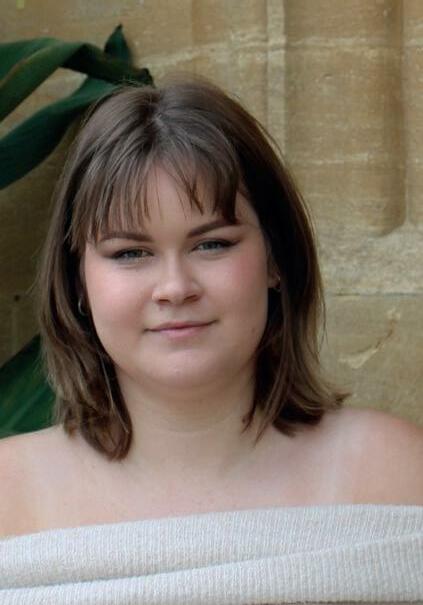
Isabella Godley (PPE, 2020), JCR President
After the dramatic impact of Covid restrictions on our lives over the past two years, it was central to the JCR’s work in 2021/22 to ensure new students felt welcomed and that gaps left from the pandemic lockdowns between year-groups were bridged.
To this end, we introduced a Freshers’ Officer on the Bench, enabling first years to have more of a voice. We also increased our events programme (the Mansfield College Ball being a highlight), widened our social media presence, and renewed our focus on welfare. The Bench worked to maintain inter-year communication through the ‘Adopt a Finalist’ and ‘College Family’ traditions. Development work in the JCR’s physical space and the College Bar encouraged greater use and helped us grow closer as a community.
With our core objectives of diversity and inclusivity in mind, the JCR Equalities Reps have worked hard to organise events and facilitate discussion among students. ‘Feel Good Fridays’ events, organised by our Women’s Officer, provide a safe and comfortable space for women to relax and interact; our Disabilities and Mental Health Officer started work on an access programme for those with disabilities; and financially, we supported various groups within College through increases in our Gender Expression and Taxi Fund.
In response to crises around the world, the Bench passed a motion to raise donations for the Ukrainian Red Cross and Save the Children Ukraine. Other regular charitable events included charity formals and charity elections, with donations going to Oxfordshire Sexual Assault and Rape Crisis Clinic (OSARCC), Oxford Mutual Aid, Beat Eating Disorders, and Autism at Kingwood.
The Climate Crisis remains a top priority and our Bench has worked closely with Mansfield staff to support the College’s eco-friendly initiatives.
I would like to thank the JCR Bench for their commitment and tireless work through the year. It is amazing to be part of a community where everybody is so passionate. Thank you to the JCR for being so involved, the MCR for their cooperation, and the SCR for being so receptive to our concerns. It has been wonderful to be the JCR President during 2021/22.

Amirmohammad Farzaneh (DPhil Engineering Science, 2020), MCR President
‘The MCR feels like a second home to me’ is a statement I’ve often heard from MCR members – and it is true for me too. In 2021/22 we triumphantly bounced back from Covid restrictions, managing to reunite the MCR family again. My main goal as President was to make all our students feel welcome at Mansfield, and I strongly believe we have been successful.
A brand-new range of MCR events shows how hard our committee worked. A big Halloween party, exchange Formal Dinners with six other colleges, and the first-ever Nowruz (Iranian/ Persian New Year) celebration, are just some examples. The year ended with our MCR boat party, which started in 2020/21 and is now known as one of Oxford’s best MCR parties.
To make our members feel welcome and at home at Mansfield, we put great effort into providing welfare support. MCR members can contact any of our Bench to discuss their welfare concerns, and during the year we also hosted numerous welfare-oriented events such as brunches, and cakes and compliments.
I am honoured to be President of such a diverse range of students. I am also extremely grateful for the hard work of our MCR Bench, and the support provided to us by the College. It is my firm conviction that all our hard work has produced Oxford’s most welcoming MCR.
6
Visiting for a year, making friendships for life
Yirui Wang, VSP Representative
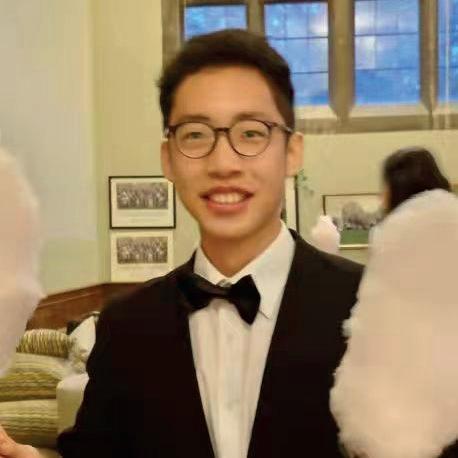
Leaving friends and family at home and arriving in Oxford was a huge step for the Visiting Student cohort this year. After all the pandemic restrictions it was great fun for us to enjoy normal Oxford life – and we immersed ourselves in this from Michaelmas Term 2021.
What makes the Visiting Student programme so appealing is the ability to choose any course to study; the system is really flexible. Diving into challenging lectures and tutorials, having discussions with experts in a variety of scholarly disciplines, and then chatting about these topics with classmates and friends – it was all immensely enjoyable, and inspiring. We took two demanding courses per term; after spending lots of time reading papers, completing worksheets and composing essays, we came to appreciate the intrinsic merits of the University’s unique teaching arrangements. After some adjustment, I gradually became familiar with the tutorial system. I had an extraordinary time.
Beside the academic commitments, we also threw ourselves into an abundance of extracurricular activities. Rowing, fencing, hockey, tennis and badminton were among the favourite sports of the Visiting Students. Colourful College events, including weekly Formal Halls, termly ‘Bops’ and the especially popular ‘Champagne and Chocolates’, offered us fantastic opportunities to socialise and meet new friends. The highlight of 2021/22 was certainly the Mansfield Ball, giving us a taste of a major Oxford celebration. There were so many chances to build friendships and bonds during key events in the Mansfield calendar – many of which embraced different cultural groups and demonstrated the College’s inclusive spirit. The Thanksgiving Dinner and a Lunar Year themed meal to welcome the Year of the Tiger were particularly enjoyed by us all.
I am immeasurably grateful to Mansfield for helping all the Visiting Student community carve out these memories, and for serving as our second home.
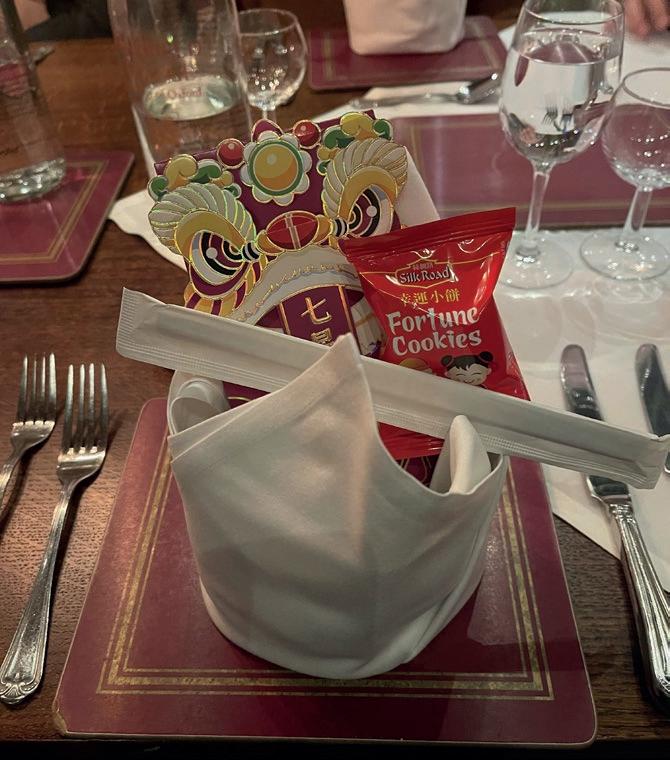

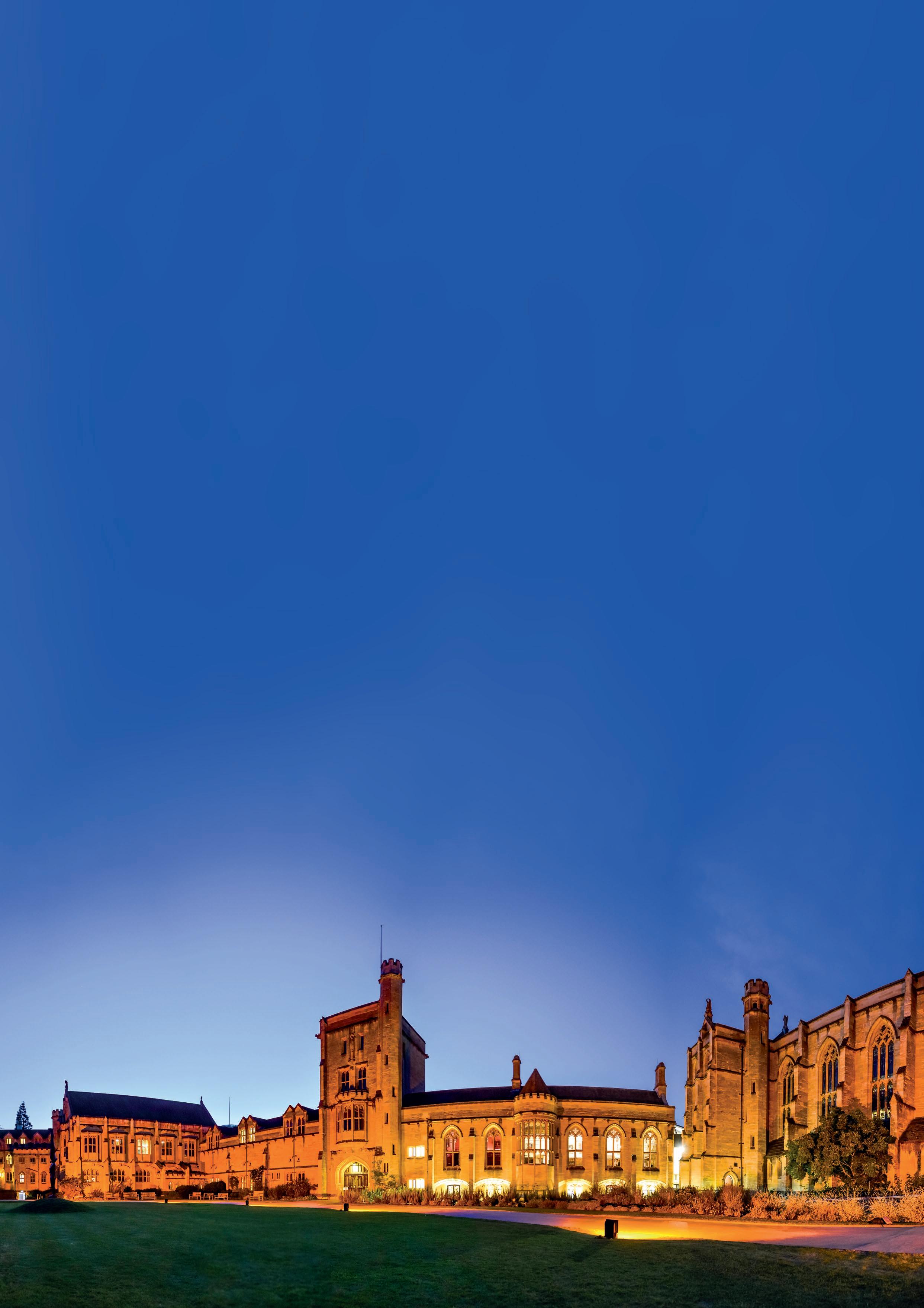
7
Table decorations at the Lunar Year themed dinner
Coming out of the archives: documenting LGBTQ+ academic history
LGBTQ+ history is a vibrant area of research exploring the diverse contributions and experiences of LGBTQ+ people. Dominic Jones (incoming Visiting Fellow, Trinity Term 2023) discusses the progressive developments in this emerging academic discipline, which include the establishment of a Chair of the History of Sexualities at Mansfield.
The past can be studied from a wide range of perspectives. When I was reading Ancient & Modern History at Oxford (1989-92) many of the papers were described as either ‘political’ or ‘social and economic’ history. Study of the latter had often been developed by historians of class, including those working from Marxist perspectives. Over the last half century there has been an increasing focus on other aspects of status and identity. Postcolonial writers have explored contested histories of race and feminists have critiqued gender. LGBTQ+ history represents a key development that focuses on groups once dismissed as being of marginal importance.
Terminology is a key issue in LGBTQ+ history because the ways in which variations of human sexuality and gender are discussed have changed considerably over time. The term LGBTQ+ is a recently coined acronym referring to lesbians, gay men, bisexuals, trans people and those who identify as queer. The plus sign indicates a desire to include other related groups, such as intersex individuals and asexuals. Not everyone accepts LGBTQ+ as definitive, since it is rooted in western cultural concepts, and this led to extensive discussion concerning the title and content of the forthcoming
‘LGBTQ+ history represents a key development that focuses on groups once dismissed as being of marginal importance.’

‘Oxford Handbook’ on this topic, which I am editing. Controversy and disapproval were often shown to historians who displayed interest in these issues before the Sexual Offences Act (1967), which partially decriminalised male homosexual behaviour in England and Wales. Some of the pioneering work at Oxford, such as Sir Kenneth Dover’s Greek Homosexuality (1978), took place in Classics (Literae Humaniores) rather than in what was then termed Modern History. Elsewhere in Britain, what was then called gay or lesbian history, was often pioneered by activists and scholars working in left-leaning institutions, such as Jeffrey Weeks at the Polytechnic of the South Bank (now London South Bank University).
The AIDS crisis of the 1980s led to the emergence, particularly in English Literature departments in the United States, of Queer Theory. This made some radical claims including that the study of queerness provided a key to understanding sexual relations in general, and that sexuality was a shaping force behind a wide range of cultural, social and political changes. The influence of such approaches made itself felt in History departments in the 21st century, with books such as Laura Doan’s Disturbing Practices: History, Sexuality and Women’s Experience of Modern War (2013). There are now several academic journals, book series and university courses devoted to similar perspectives.
I began my career as a historian of religion which, I rapidly discovered, had a complex and fascinating relationship with LGBTQ+ issues. Many scholars working in this discipline gained their academic posts because they were also valued as experts in wider fields of history and cultural politics.
8
‘There are still very few positions dedicated to the advancement of these topics, which is why the establishment of the Jonathan Cooper Chair of the History of Sexualities, based at Mansfield, is such an important development.’
There are still very few positions dedicated to the advancement of these topics, which is why the establishment of the Jonathan Cooper Chair of the History of Sexualities, based at Mansfield, is such an important development. It will greatly further the ability of the University of Oxford to emerge as a leading centre for research and teaching in a field that is of rising interest to new generations of students. It involves a bold investment in complex issues of social justice such as the rights of trans people and the evaluation of western concepts in their global context. It will place Mansfield College – which I have the privilege of joining as a Visiting Fellow this academic year as I complete my new book Oxbridge Aesthetes: Imperial Manhood and Queer Youth Cultures – at the centre of these ambitious and progressive developments in the academic study of history. It will also contribute to furthering a learning and social climate in which the full diversity of students is welcomed and supported in their academic choices and personal identities.


Professor Dominic Jones is a cultural historian at Keele University, focusing on the histories of gender, sexuality and religion since the 18th century. His latest book is Freak to Chic: ‘Gay’ Men in and out of Fashion after Oscar Wilde (Bloomsbury, 2021). Dominic will hold a Visiting Fellowship at Mansfield in Trinity Term 2023.
9
A year in Development
Tess McCormick, Development Director
We have been blown away by the generosity shown by Mansfield’s alumni and donor community this year.

A total of £7.9m was received towards Mansfield’s priorities in the 2021/22 financial year, making this a landmark year for giving to College: the highest figure ever received.
A significant proportion of this was the remarkable donation of £4.9m from Professor Peter Baldwin and Dr Lisbet Rausing, in honour and memory of their friend, human rights barrister and trail-blazing gay rights campaigner, Jonathan Cooper OBE, to establish Oxford University’s first Chair of the History of Sexualities, permanently at Mansfield College.
The full figure above (which is cash income, exclusive of pledges) breaks down as follows: Sales
£412,813 Scholarships
£450,719 Buildings, Environment & Culture
£265,273 Mansfield Matters (unrestricted)
Figures above incorporate both endowment gifts and spend in year.
Teaching & Fellowships Access and Student Support
£5,435,597
Teaching and Fellowships
£1,344,351 Access and Student Support
Mansfield Matters (unrestricted) Scholarships Buildings, Environment & Culture
This year we have produced a separate ‘Impact Report’ so that we can tell the stories behind this incredible groundswell of support, and how gifts at all levels are having an impact on our whole academic community today, helping to secure Mansfield’s future.
It is truly inspiring to see the power of our collective alumni and donor community to change people’s lives through their support of Mansfield, moving this fantastic College forward towards an even greater future.
Here in the Development team, we always want to hear from you. We are on hand throughout the year to answer your queries about regular giving, how to leave a gift in your Will, or other ways that you can make a fundamental difference to your College.
We are delighted to list everyone who has supported College this year on pages 34-35.
Thank you so much for your support.
10
Mansfield College: an all-embracing welcome
Shukria Rezaei Communications Officer
Recognised as the joint-first University College of Sanctuary in 2021, Mansfield has strengthened its founding promise to welcome the excluded into Oxford’s academic community. We now also offer a home to those displaced by war and humanrights abuses.
Only 1% of UK refugees and asylum seekers are in higher education. Mansfield is committed to redressing this imbalance. After welcoming Ilham Abdalla Tagelsir Ali, our first Council of Lutheran Churches Sanctuary Scholar, in 2021/22, the College is now offering an additional scholarship specifically to a Ukrainian refugee.
We also seek to build a culture of welcome, inclusivity and awareness of people seeking sanctuary beyond our College. In December 2021, Mansfield hosted a Shab-e-Yalda, marking the longest night of the year in the Persian calendar, by bringing together Oxford students and distinguished guests with refugees from Afghanistan. We took our celebration to a hotel where evacuees from the horrors of Kabul Airport were staying. A wonderful evening was spent feasting on delicious cuisine and reading the poems of Hafiz and Rumi.
Multifaith and multicultural celebration Mansfield held various other multifaith and multicultural events throughout 2021/22, including a Lunar Year themed dinner to welcome the Year of the Tiger in February. In March, we organised a Nowruz celebration, a festival held in Iran, Afghanistan, Tajikistan and elsewhere on the first day of the Solar Hijri New Year. We brought together

students from across the University to mark the arrival of spring by decorating a haft-sin table spread with seven items symbolising nature’s renewal. Students also recited Persian poetry, sang traditional music and enjoyed a Persian-themed dinner.
Ramadan, the Islamic holy month, started in early April. In May, Oxford students, academics and staff along with members of the public met in the Chapel to break their daily fast with a traditional Iftar meal. Oxford student and Muslim scholar, Ammar Naqvi, shared a pre-dinner reflection on the holy month, which was followed by a Rumi poetry recitation by MCR BAME Rep, Sina Maghami Nick; end to fasting was called with an Adhan (Call to Prayer) by Mohammad Mahdi.
These festivals brought students from similar backgrounds together, allowing them to share experiences. In 2022/23 we look forward to another year of poetry, outreach, and cultural celebration.
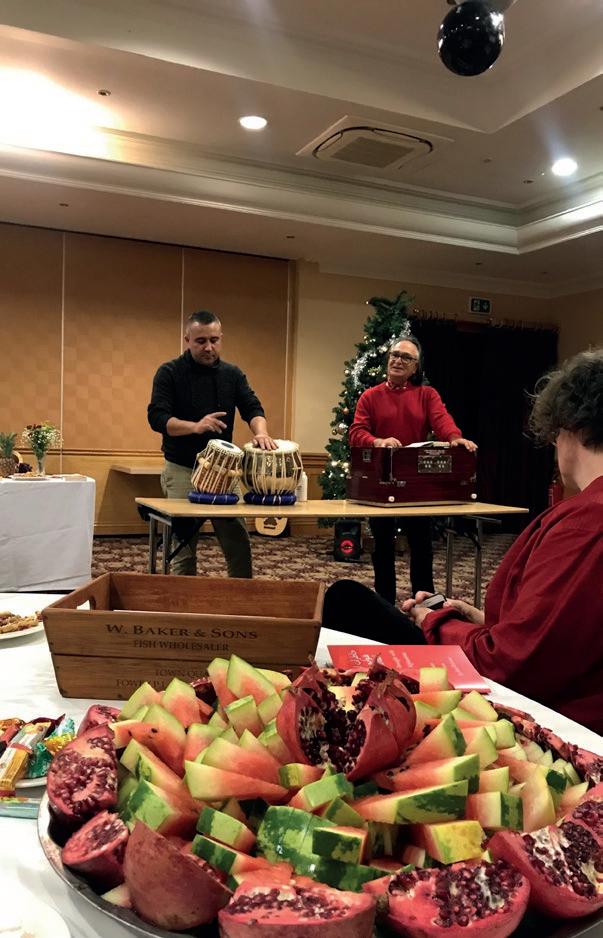
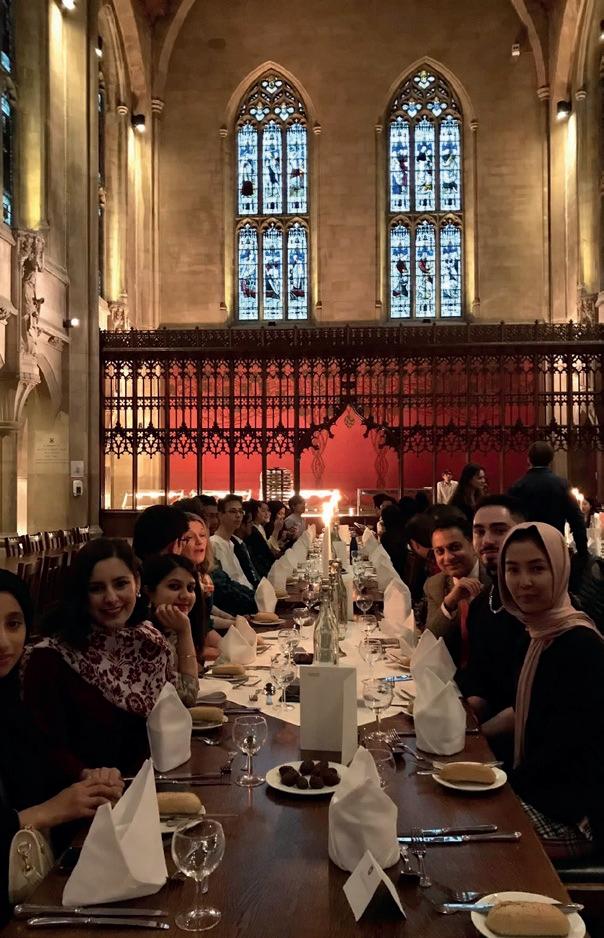

 Lunar Year themed dinner
Shab-e-Yalda celebration
Shab-e-Yalda celebration
Lunar Year themed dinner
Shab-e-Yalda celebration
Shab-e-Yalda celebration
11
Guests feast at the Iftar dinner

Fellows’ focus
Updates on world-leading research and vital projects from our academic community

Magnetic research attracts major grant
Stephen Blundell, Professorial Fellow in Physics
I have been awarded a European Research Council (ERC) Advanced Grant of €3m which, Brexit bureaucracy permitting, will allow me to develop some new experimental techniques using muons (magnetic radioactive particles) in combination with microwaves to learn about a family of magnetic compounds that exhibit quantum spin liquid behaviour. Magnetic spins on a lattice tend to align into an ordered configuration at low temperature, but in quantum spin liquids they can’t. Instead, they adopt a very unusual highly correlated liquid-like state. It’s not random, since the spins are highly entangled, and the quantum spin liquid state involves the superposition of many individual configurations (Schrödinger’s cat famously involves a superposition of just two configurations).
Mathematical Sciences for Refugees, Asylum, and Sanctuary Seekers
Ian Griffiths, Professorial Fellow in Industrial Mathematics


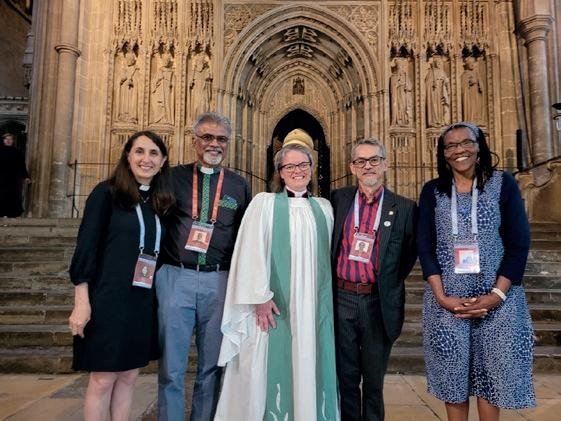
Peter Grindrod, Sam Cohen and I, from Oxford Mathematics, have created the Mathematical Sciences for Refugees and Asylum and Sanctuary Seekers, in partnership with David Levy and Ash Ardian from Asylum Welcome, and Cara (Council for At-Risk Academics). Our mission is to support the community of asylum-seeker mathematicians.
We have so far run four online workshops designed to make refugees feel welcome in the UK. The initiative is aligned with the University’s pledge to support refugees, and with the Oxford Colleges of Sanctuary, and has recently gained support from the London Mathematical Society to broaden its reach.
Mansfield tutor at the Lambeth Conference
Jennifer
Strawbridge, Associate Professor in New Testament Studies
I have spent the last four years working on the biblical elements of the Anglican Communion’s Lambeth Conference, a two-week gathering of almost 700 bishops from 165 countries that took place in summer 2022. I led a team of scholars from 19 countries to create a commentary on 1 Peter and Bible studies for the Conference. With four colleagues from Kenya, the UK, Brazil, and North India, I helped lead a two-day retreat for the 700 bishops (including preaching at Canterbury Cathedral), assisting the Archbishop of Canterbury with his daily expositions. For my service through biblical scholarship to the worldwide Anglican Communion, I am proud to have received the Cross of St Augustine, the second highest international award for service within Anglicanism. Last but not least, I was delighted to have the chance to work with Mansfield Finalist Lizzy Flaherty (Theology & Religion, 2020), who served as one of the Conference Stewards.
12

International collaboration on Dynamic Cardiac Monitoring
Dr Tingting Zhu, Stipendiary Lecturer in Engineering
I have been awarded funding by the Royal Society and the Natural Science Foundation of China to lead the international collaboration on developing a machine learning framework and open-source platform for dynamic cardiac monitoring. Conducted in partnership with Professor Chengyu Liu and his team from Southeast University, China, my project aims to provide open-source models to be used in any remote setting. These should assist clinical decision support and lower the healthcare costs for an individual and the healthcare provider. A novel database platform will be built to provide researchers with a large, rich dataset for developing and validating new methods in medical informatics.
Protecting archives of climatic change
Ash Parton, Stipendiary Lecturer in Geography
For the past 15 years I have been conducting research in the deserts of the Arabian Peninsula. I’m fascinated by the knowledge that these vast sandscapes were once littered with lakes, rivers and rolling grasslands, and have focused my work on the nature and timing of these transformations. Along with input from archaeologists and geneticists, these investigations have helped us to understand the way in which changes to the landscape and ecology of Arabia have impacted the evolution and development of human populations. Recently my research has included the development of Geoheritage frameworks to assess and protect important archives of climatic change.

 A freshwater lake in the Rub’ al Khali, Oman. © Ash Parton.
A freshwater lake in the Rub’ al Khali, Oman. © Ash Parton.
13
Juma, a local Bedouin elder, Ash’s friend and guide in Jordan
Pedagogical disobedience:
unlearning, unthinking and decolonising International Development Studies
The paradigm we call international development has functioned as a global organising political and economic structure for nearly 80 years. Yet impoverishment persists and, in some cases, has worsened. Amber Murrey argues that the paradigm needs overturning.
What does it mean to study international development? Whose knowledges and perspectives have, do, and should inform and shape international development policy and programming? In a collaborative new book and teaching project with my colleague, Professor Patricia Daley, we ask readers to consider these questions. The book is designed to push at the boundaries of how we think about and practise international development. It is intentionally provocative in articulating disobedience in the classroom as central to decolonising Development Studies.
We unmask the coloniality within foundational literatures of Geography and Development Studies. Colonial legacies and colonial logics continue to shape the ways in which land, well-being, progress and development are conceived of and practised. So how do we, through our classroom and activist practices, work collaboratively to create the radical imaginaries and practical scaffolding we need for
decolonising development? Given the centrality of forms of expertise in fostering and legitimising histories of Eurocentric development practice, we argue that the classroom is a key battleground in the larger struggle to decolonise development. Employing a practice that we have called pedagogical disobedience, we chart a critical interdisciplinary approach to unthinking, unlearning and decolonising International Development Studies. Disobedient pedagogies demand explicit attention to thinking against and pushing against those ways of thinking and acting fostered by corporate and colonial logics, relations, and histories. A radical praxis is necessary to encourage forms of unlearning in the classroom. That is, while traditional pedagogical approaches hold that education is about building up and expanding upon the pre-existing knowledge and skills of students – sometimes, critical education is about coming to terms with the ways in which what we have learned previously is inaccurate

14

(often based upon colonial and racialised logics), or is inadequate to survival in our increasingly ecologically and economically precarious 21st century. Through pedagogical disobedience, we have developed a critique of the longstanding colonial practice of ‘incorporating’ marginalised people within dominant development paradigms to condone or exacerbate capitalist exploitation, at the same time as we actively attend to the necessary project of imagining liveable futures.
Disobedient pedagogies entail teaching unconventional ideas that seem to have been rendered impossible through dominant institutions and categories of thought. This kind of disobedience in the classroom demands that students take on some of the responsibility for unlearning the norms that they have been disciplined to accept. Equally, disobedient pedagogies ask educators to engage in forms of unteaching which actively create the space for radical exchanges.
Patricia Daley’s and my book engages with practitioner debates and outlines decolonising

pedagogies that seek to empower students to question accepted wisdoms. For us, this is a project that is of particular urgency within our location at Oxford University. Our book is based on our experiences of teaching throughout the years, but in particular of collaboratively teaching a very popular option, ‘Critical Development Geographies’, to our second- and third-year undergraduates studying Geography. It is aimed at students, teachers, practitioners, and activists and contains rich empirical examples, discussion questions, and activities for more applied learning. Our objective is for readers to think through what it means to engage in decolonising international development in the classroom and to chart convivial and dignified futures beyond its limits.
Dr Amber Murrey is Tutorial Fellow in Human Geography at Mansfield. Her forthcoming book, Decolonizing Development Studies: disobedient pedagogies for decolonial futures, co-authored with Professor Patricia Daley, will be published by Pluto Press in 2023.
 Amber’s new book builds on her diverse and global teaching experiences, including her first teaching post in Development Studies at Jimma University. Statue of student reading at Jimma University, Jimma, Ethiopia: 2015.
Amber Murrey and Professor Aziz Fall at the launch of Amber’s first book, ‘A Certain Amount of Madness’: The Life, Politics and Legacies of Thomas Sankara (Pluto Press, 2018) in Cairo, Egypt.
Amber’s new book builds on her diverse and global teaching experiences, including her first teaching post in Development Studies at Jimma University. Statue of student reading at Jimma University, Jimma, Ethiopia: 2015.
Amber Murrey and Professor Aziz Fall at the launch of Amber’s first book, ‘A Certain Amount of Madness’: The Life, Politics and Legacies of Thomas Sankara (Pluto Press, 2018) in Cairo, Egypt.
15
Amber Murrey addresses the crowd at the 2020 ‘Rhodes Must Fall’
Freedom
Summer Teach-in in Oxford

The Arts at Mansfield


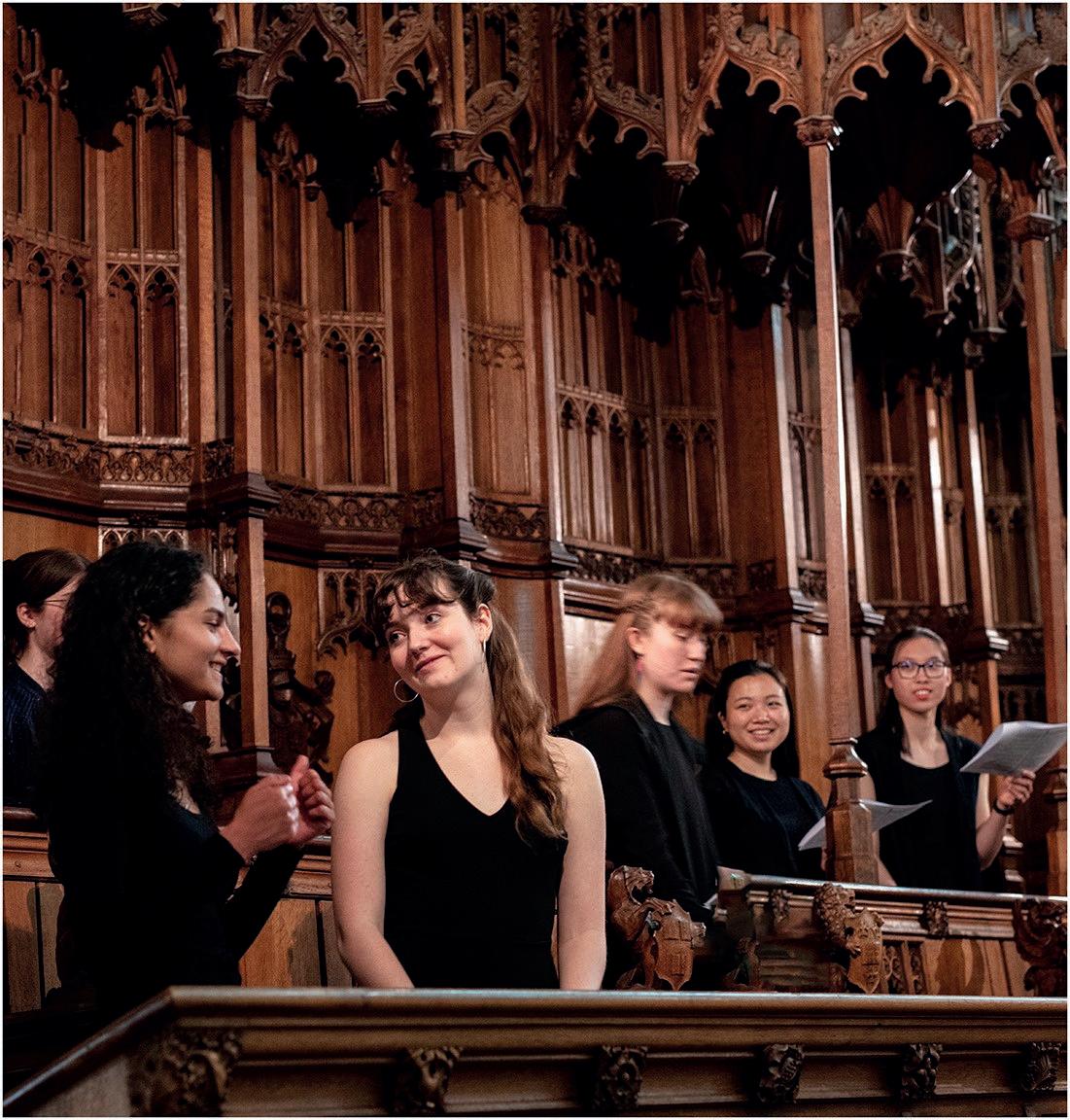
Shab-e-she’r: poetry night
Dr Saif Mahmood, Visiting Scholar at the Bonavero Institute of Human Rights
Indo-Iranian poetry comes alive every Wednesday evening at Mansfield. A diverse and eclectic group of poetry-lovers congregates to recite, sing and discuss poems in the original languages alongside English translations. At the 18 informal sessions held in 2021/22, the group traversed a fascinating terrain of Persian, Urdu, Turkish, Hindi, Punjabi, and even Hazaragi and Pothwari poetry. The works discussed included classical masters such as Rumi, Hafez, Mir and Ghalib, modern greats like Iqbal and Faiz, and contemporary poets like Zehra Nigah.
Music at full force
Lauren Aitken (Maths, 2021), Mansfield Music Society Publicity Officer
This past year at Mansfield has seen the return of music at full force, with our Music Society welcoming both new and returning students after a year when the pandemic shut down live performance. The Choir sang in Chapel services each week, and in the traditional carol concert at the end of Michaelmas Term. They joined soloists and the wind ensemble, which ballooned in size over the year, at frequent concerts featuring students from across the University.
The Choir also organised a ‘Sing for Ukraine’ outdoor event, raising £130 for charity, and celebrated Mansfield’s 135th birthday with a recital.
A highlight of the year saw Richard Pinel, an award-winning organist, come to College in March 2022 to perform a recital inaugurating the Chapel’s newly restored organ.
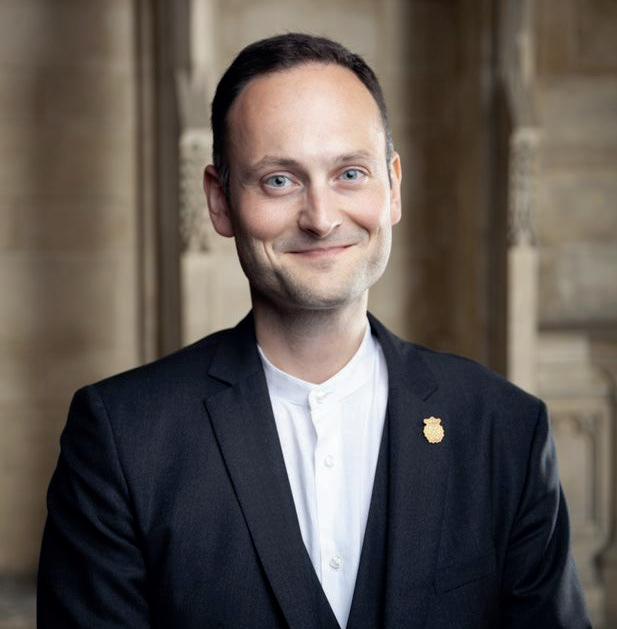
‘I am delighted to have taken over as Director of Music from the wonderful John Oxlade. Music at Mansfield is thriving, and is central to the College experience and education of our students.’
Tom Hammond-Davies, Director of Music
16
Sold-out shows with glowing reviews: student theatre at Mansfield
Hana Andari (English, 2020), Mansfield Players President
The year 2021/22 saw two highly successful student productions go ahead, with funding from the Mansfield Players. Quartet, a play by Sam Spencer (English, 2019), was co-directed by fellow Mansfielder Alex Hopkins-McQuillan (English, 2020) and enjoyed a sold-out run in Michaelmas. In Hilary, the Players supported a production of Tanika Gupta’s adaptation of A Doll’s House, featuring cast and crew from Mansfield. Both plays not only did well in terms of ticket sales, but received positive reviews in Oxford’s student newspapers. The Players also supported Quartet’s run at the Edinburgh Fringe in August 2022.
Drama for justice
Srutokirti Basak (History, 2019)
My final year at Oxford began on a difficult note following several Al-Jazeera reports on sexual harassment on campus. As a student community we felt there was an urgent need for a response from both faculties and further plans of action to protect students from all forms of sexual violence.
To convey the anger among students, my friend, Georgie, and I organised a rehearsed reading of Lucy Kirkwood’s Maryland at Mansfield. Maryland was written in response to the Sarah Everard case and deals with issues of sexual assault and police violence. On the night, we also had speakers from ‘It Happens Here’, an anti-sexual violence campaign associated with the Oxford SU, and a speech from Professor Rachel Fraser, Associate Professor of Philosophy and Michael Cohen Fellow in Philosophy at Exeter College. It was an evening to express our anger, encourage contemplation, and to foster our need for community.
In Hilary Term, I was the resident historian for Velvet Morning Productions’ showcase of Tanika Gupta’s A Doll’s House. Gupta’s adaptation of Ibsen’s original play explores questions of race, empire and patriarchy in 19th-century Calcutta, and how these themes pertain to our political realities today. For the show, I researched the context of the late-19th century British Raj, with a particular focus on Calcutta. During the first week of rehearsals, I also presented a talk to the actors about the historical context, linguistic details, and cultural cues of the period. I was glad to be part of a show where I was able to blend my historical interests with my interest in theatre.
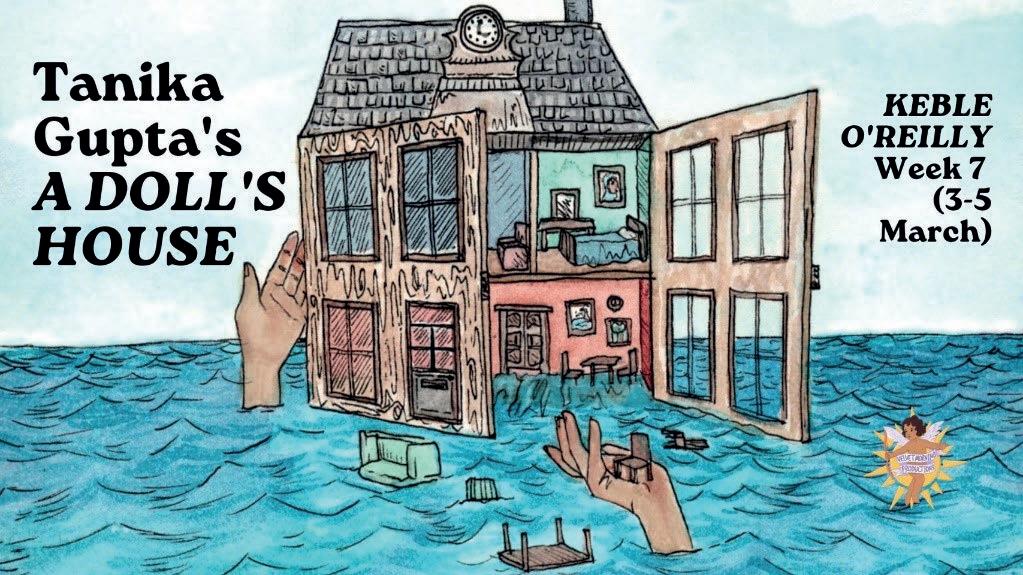
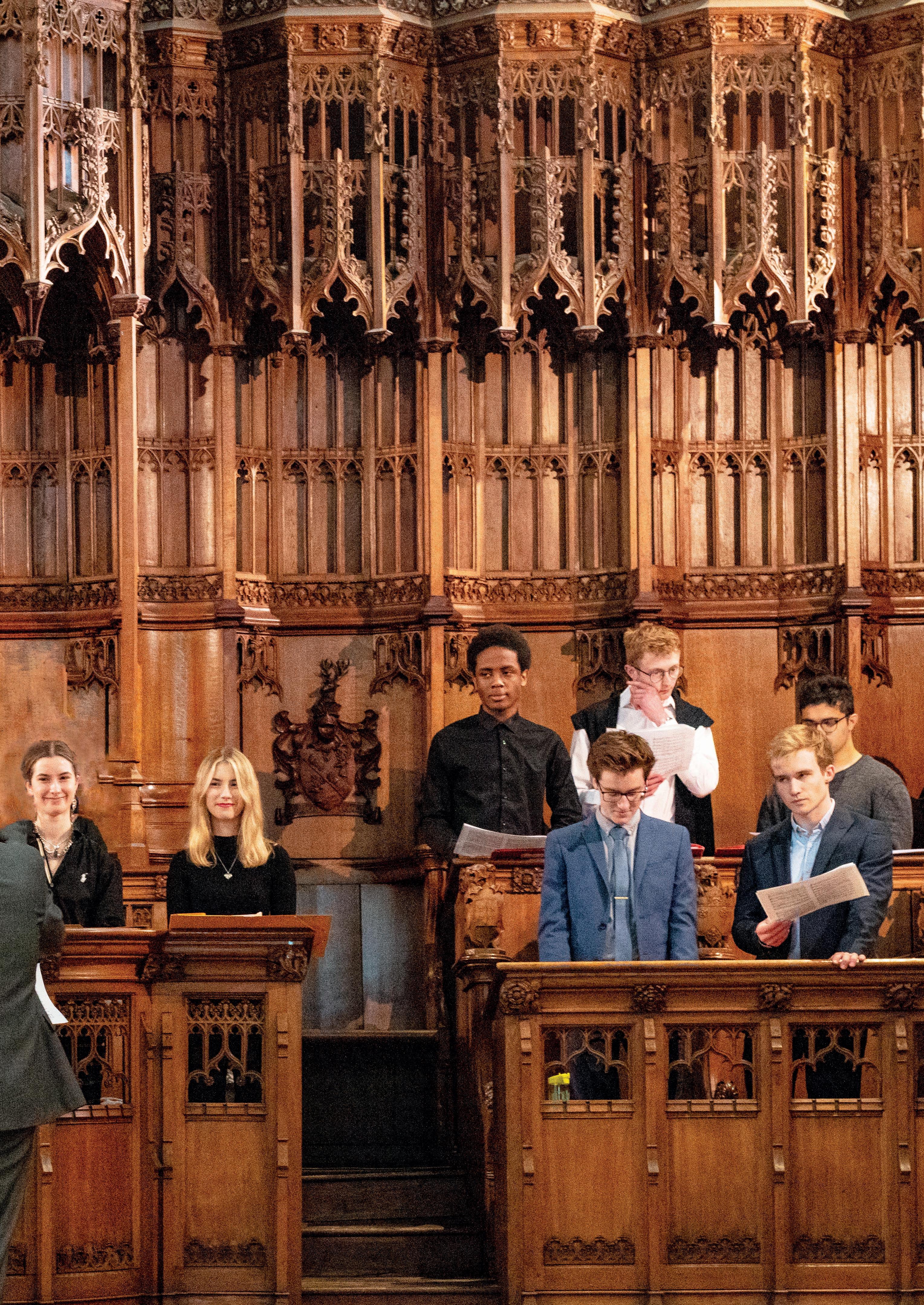
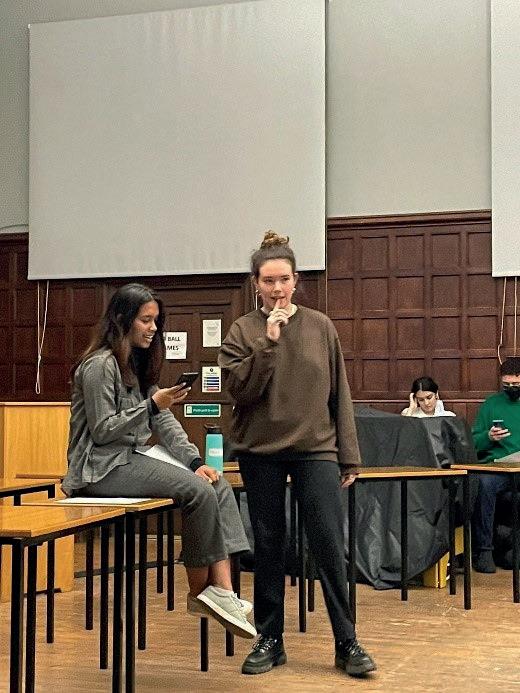
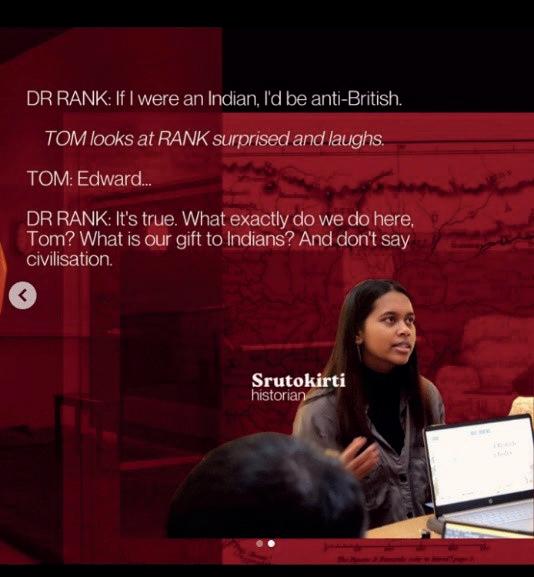

17
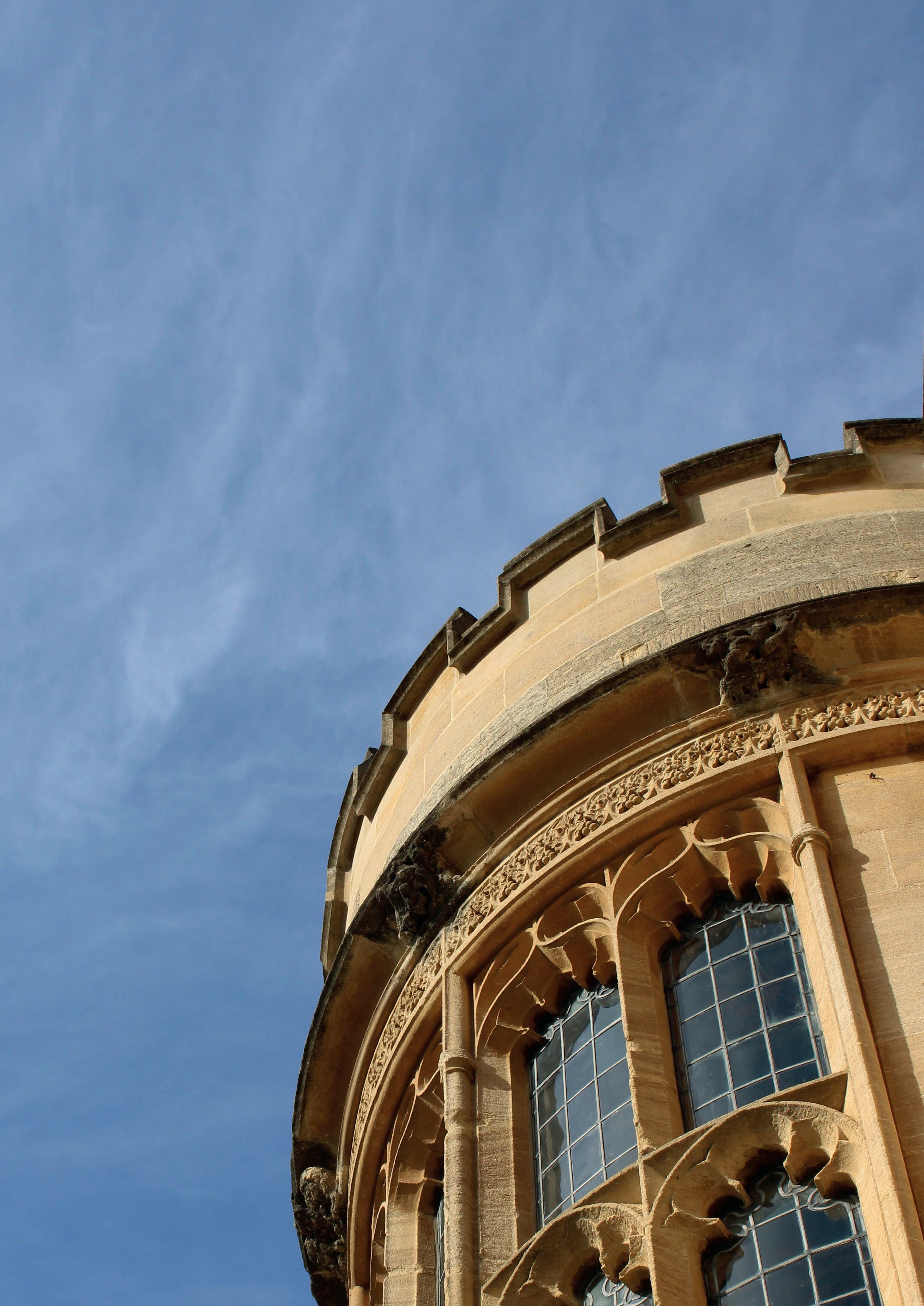
Mansfield Ode
Morning unfurls in the crypt.
My body barely remembers that it is my body, as my limbs detach from my book. I’m mulling having my third coffee of the day but my friend tells me no. I’m lucky to have that kind of love. Instead of caffeine, my face cleaves the October breeze, and I sit in front of the Gormley. Love whispers its greeting to me, as I walk into that weathered arch, I see all the fresh smiles.
I’m tired of love masquerading as scarce. How could it be?
When it is evening, and the college is aglow in that golden yellow and it’s not the champagne that fizzes me giddy all the way home.

18
Michelle Lin (VSP, 2021)

Equal access to vaccines
Exposing the limits of international human rights law?
The Covid-19 pandemic has caused millions of deaths since 2020 and government efforts to contain the spread of the virus have resulted in widespread limitation of human rights. Catherine O’Regan surveys the vital research in this area currently being conducted at the Bonavero Institute of Human Rights (BIHR) and explores how international human rights law might be used to ensure equal access to vaccines.
Academics at the BIHR have been engaged in research on the human rights implications of Covid, and the responses to it, in a range of projects. Several Bonavero reports (which can be found at https://www.law.ox.ac.uk/content/bonavero-reportsseries) have been published outlining this research: one explored how the pandemic and the responses to it in the United Kingdom had had adverse effects on people with disabilities; another provided an overview of emerging international human rights law guidance on how governments should ensure that responses to Covid were human-rights compliant; and a third contained a human rights and rule-of-law assessment of legislative and regulatory responses to the pandemic in 27 jurisdictions.
In addition, research has been undertaken to investigate how human rights law addresses the question of equal access to vaccines across the globe. The virus’s capacity to produce variants that evade immunity means that the best way to prevent further deaths is through ensuring that as many people as possible worldwide are vaccinated. Ensuring equal access to vaccines is therefore a matter of global importance. Moreover, production of vaccines has reached the point where it could meet global demand, if vaccines were equitably distributed. So far, however, vaccination rates have been notably inequitable. They are highest in the developed world, while populations in developing countries, especially Africa, remain woefully under-vaccinated.
In an article to be published in Shreya Atrey and Sandra Fredman (eds), Exponential Inequalities (OUP, 2022, forthcoming), I examine how international human rights law can contribute to ensuring equal access to vaccines. The article notes that although the provisions of the International Covenant on Economic, Social and Cultural Rights (particularly article 12, which protects the right to the enjoyment of the highest attainable standard of physical and mental health; and article 15, which protects the rights of everyone to enjoy the benefits of scientific progress) strongly support
equal access to vaccines, there are various reasons why those provisions may not be effective in securing such access. These include not only the state-centric approach of international human rights law and its weak enforcement mechanisms, but also the strong international law protection for patents under the World Trade Organisation (WTO)’s Agreement on Trade-related Aspects of Intellectual Property Rights (TRIPS).
Important steps have been taken by new institutions of global health governance, such as the Global Agency for Access to Vaccines (GAVI) and Coalition for Epidemic Preparedness Innovations (CEPI), to ensure that equal access to vaccines is achieved, but much work still needs to be done.
The article concludes that the Covid-19 pandemic has illustrated how inequality between countries, as well as within them, can be exacerbated by a global health crisis.
The pandemic will continue to be an important field of enquiry for researchers at the Bonavero Institute in the year ahead.
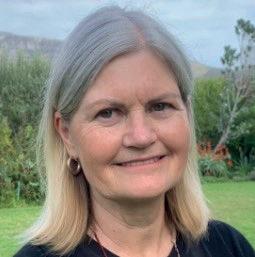
Professor Catherine O’Regan is the Director of the Bonavero Institute of Human Rights (BIHR), Professor of Human Rights Law, and Fellow at Mansfield College.
19
A year of alumni engagement and welcome
Gemma McPhail, Outgoing Alumni Relations Manager
‘…you need a village, if only for the pleasure of leaving it. Your own village means that you’re not alone, that you know there’s something of you in the people and the plants and the soil, that even when you are not there it waits to welcome you.’
Mansfield is your village; there is always something of you here and we are always here to welcome you back.
This year it has been a joy to see many of you at events in College and beyond. Some highlights: a packed Hands Lecture given by Chris Bryant MP (English, 1980); a buzzing alumni drinks event at the National Liberal Club in London; watching current Geography students meeting and quizzing those who had trodden the same path 10/20/30 years before at the 1887 Society Dinner; bringing together Mansfield alumni in New York and Washington over drinks and lunch; and sharing strawberries and cream in the sunshine with you, your friends and families on the Quad in June 2022.
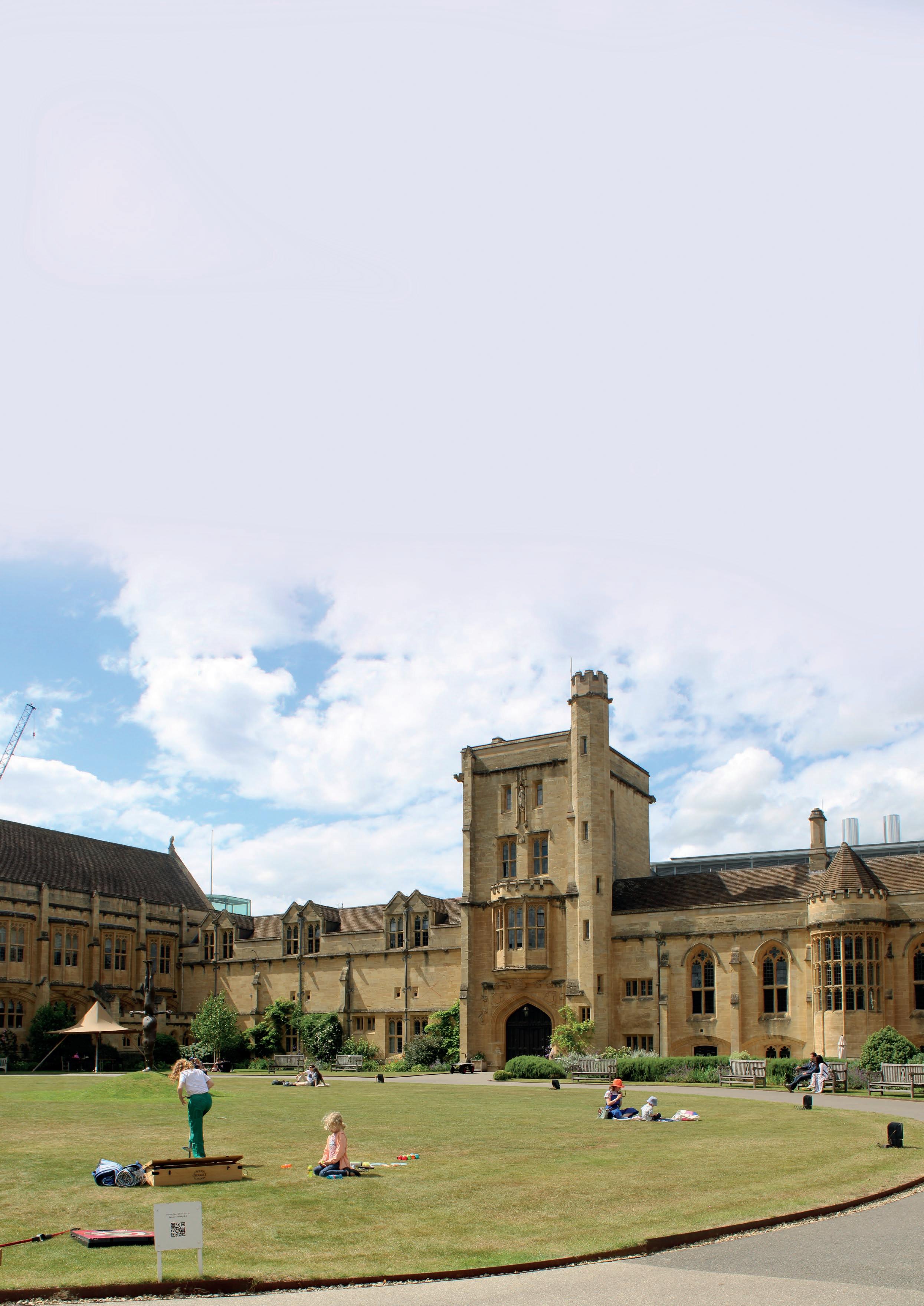 Cesare Pavese
Cesare Pavese
We also held an event for our newest alumni at a Student Leavers’ Celebration in June, welcoming them into the alumni community and sharing the benefits of engaging with a global network of Mansfielders.
‘Mansfield is your village; there is always something of you here and we are always here to welcome you back.’
Alumni, Friends and Family Day 25 June 2022 20

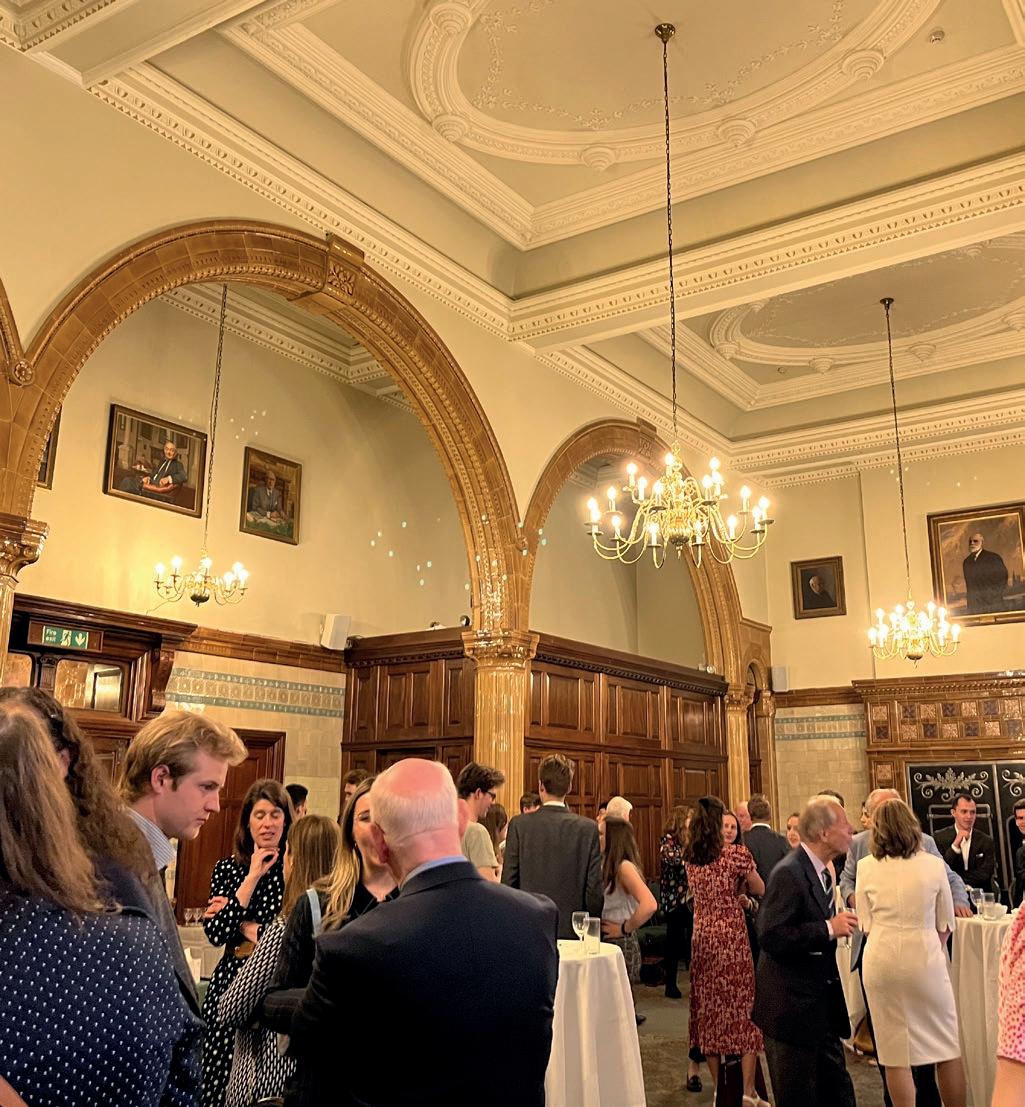
Here in the Development team, we have greatly enjoyed welcoming many of you back to visit College – do drop by and see us any time. And for those of you we have not been able to see face to face this year, we have enjoyed engaging with you online, hearing your news and updates and keeping you in touch with all the College news.
Your commitment to engaging with us for the mutual benefit of College, our students and each other is so important. Your village, your Mansfield community, is always here to welcome you. The more you engage, the more benefits you can reap.
Our upcoming programme of events is on the back of this edition of your Magazine – do join us.
You can contact the Development team with ideas, feedback, and to share your news at development@mansfield.ox.ac.uk. We are always very pleased to hear from you.

21
Graduates at the Student Leavers’ Celebration in June
Student Leavers’ Celebration in June
London Drinks Reception
Where are they now?
Updates from our global alumni community
Nick Atkinson (Geography, 1975)
After seven fun years as a transport consultant specialising in stakeholder engagement, I have hung up my mouse and whiteboard marker and am enjoying retirement. Field trips from now on will be purely for enjoyment with my wife Karen, who also retired this spring.
Nick Barwick (English, 1978)
Following many years as an English teacher in the comprehensive sector, for the last 20 I have focused on working therapeutically, as a counsellor, psychoanalytic psychotherapist and group analyst. I have practised within HE and the private sector, with ‘emerging adults’ and more broadly with writers (both academic and ‘creative’), actors and musicians experiencing particularly intransigent creative blocks. I am a Professor of Counselling, Head of the Counselling Service at the Guildhall School of Music & Drama, and an established author – my most recent book being Group Therapy: a group-analytic approach (Routledge, 2018). I am also a grandfather of four gorgeous grandchildren and, as a sax player, a gigging musician.
Samantha Cocco-Klein (VSP, 1993)
I have just completed my PhD in Public & Urban Policy at The New School in New York. My dissertation examines disaster policy for children in the US.
John Bachman (PGDip in Theology, 1971)
I retired from TV journalism and am now living in Florida, where I’m profoundly saddened by the proliferation of disinformation. My wife Barbara and I have celebrated our 50th wedding anniversary, and we have been blessed with five remarkable grandchildren.
Michael Burman (Chemistry, 1962)
I recently spent a happy Oxford Open Day walking my granddaughter around Oxford and especially the Chemistry department – a subject that she wants to read, like her grandfather.
James Chew (Geography, 1981)
I’ve just completed 29 years with HSBC, currently as Global Head of Regulatory Strategy, having served in various roles across the Group. I’m also a nonexecutive director of BGF, a major investor in UK smaller companies, which has 16 offices across the UK and Ireland, and over 450 investments to date.
Radhika
Dubé (Human Sciences, 2006)
I graduated with a Human Sciences degree in 2009 and now work as Director of Community Care for NHS England. I’m also a trustee for a children’s charity called West London Zone. Previously, I’ve worked in international public health, for the UK Government and for local NHS trusts.
22
James Dunkly (PGDip in Theology, 1963)
After many decades as a librarian and teacher in several US seminaries, I have retired to Southern California, where I still do a bit of teaching (mostly online) and help to run a used-book shop in aid of needy residents from our retirement community here. My year (1963/64) at Mansfield has remained formative for me in many ways throughout my life.
Debbie Edwards (PPE, 1997)
I’ve lived in Kent since 2017, following five years in glorious Cumbria. Life in a rectory has been enlivened by two cats, a dog and chickens. I have worked for the National Audit Office since 2014.
Katie Hunter (History, 2018)
Having spent a year living and working in Germany, I am now studying for a master’s degree in Eastern European History at UCL.
Michael Hopkins (BTh Theology, 1998)
I am minister of a group of churches based around Farnham, Surrey, and Clerk of the United Reformed Church General Assembly. This year marks both my 20th wedding anniversary with my wife Rosie, and the 20th anniversary of my ordination.
Yasmin Nguyen (Human Sciences, 2018)
I am currently working at a political consultancy called Shearwater Global, in Brussels. I am doing very well and enjoying the international, diverse, and interesting community this city has to offer.
Tommaso Crestani (Arabic & Classics, 2018)
Having just finished my degree in Arabic & Classics, I’m excited to start my new career in corporate intelligence in London. I’m even more excited to see what queer venues the city has to offer.
Nicholas Mazuroski (VSP, 2007)
I am chasing two toddlers and building solar energy projects in Maine.
Simon Morrow (History, 1975)
Vassia Gkogkou (English, 2018)
After a year working in a high school in Manchester as a reading mentor with a brilliant bunch of young people, I am now studying for a master’s in History of Art at the Courtauld.
I had a 32-year career with banking multinational HSBC based in the City and Canary Wharf, working as a Business Analyst and then Project Manager, before retiring in 2012. I also served 28 years as a Liberal Democrat District Councillor on Tandridge District Council, standing down at the May 2022 elections having served as Chairman (mayor) in my final year. I continue to serve on my parish council and as treasurer of my parish church in Warlingham, Surrey, where I have lived for over 34 years with my wife Sarah (St Annes, 1975).
Sara
Adam Schwartz and I met at Mansfield in the fall of 1993. We had an amazing year there – meeting many of our fellow students and becoming friends with our British roommates. We rode our bikes all over, ate at the Alternative Tuck Shop, drank many pints, and fell in love. Adam and I married in 2001. We have two sons, Jacob (now a first-year at the University of Southern California) and Ezra (age 15). We are both lawyers and live in Washington DC. We recently visited Mansfield and it was wonderful to see that it was simultaneously the same and different. For those who met us that year, we are still very close with Jon Gannon and George York. They both live in DC with their wives and families as well.
Kropf (VSP, 1993) and Adam Schwartz (VSP, 1993)
23
Anuvrat Rao (MEng Engineering, Economics & Management, 2006)
I am founder and current CEO of 1Bstories. After nine years at Google, I decided to build worldclass content tech for all content owners globally to drive better engagement and conversion. Prior to Google, I started my career at OC&C Strategy Consultants in London.
Tarlan Suleymanov (DPhil Engineering Science, 2015)
I am still in Oxford! And working as a Senior Software Engineer at Oxbotica, developing cutting-edge perception solutions for autonomous driving systems using computer vision and machine learning.
Sarah Harkness (PPE, 1980)
Having completed an MA in Biography under Professor Jane Ridley at the University of Buckingham in September 2021, I entered and won the Biographers’ Club Tony Lothian Prize competition (https://thebiographersclub.com/?page_id=5301) with a proposal for a biography of Alexander Macmillan, founder of Macmillan Publishing. I now have a lovely agent, Caroline Dawnay, and Pan Macmillan has signed a contract with me to publish my book, to be entitled The Brothers: Daniel and Alexander Macmillan, Advocates for the Ignorant, some time in 2024. This will mark the bicentenary of Daniel Macmillan’s first job in the publishing industry – aged 10!
Graham Russell (Geography, 1972)
I’m living near Stroud, Gloucestershire, and have four sons aged 18 to 29. I now hold various nonexecutive roles including Chair of Second Step (a mental health organisation) in Bristol and Vice Chair of Gloucestershire Health and Care NHS Foundation Trust. It’s interesting being a supporter of Forest Green Rovers – the world’s greenest football club.
Sam Spencer (English, 2019)
At the end of July 2022, I began working as Script Assistant on series six of Netflix’s The Crown: an administrative role, supporting the script team on this large-scale production. I’m getting to grips with issuing script revision sets, understanding the production process, and ‘pulling sides’. I have also just returned from the Edinburgh Fringe, where my student production company – ‘Strikes Back’, co-created with Sruti Basak (History, 2019) – ran two shows for a week, receiving great reviews.
Michael Shaw (VSP, 2006)
I currently work as an analyst at the US Department of State’s Bureau of Intelligence and Research. Last year, I served overseas in support of Operation Allies Refuge, the US Government’s interagency mission to evacuate US citizens, allies, and vulnerable persons from Afghanistan.
Dana Naomy Mills (DPhil Politics, 2008)
I am the Executive Director of Peace Now, the movement I joined at the age of 14 that brought me into the world of politics (which led me to a DPhil in Political Theory at Mansfield). Peace Now is the oldest and largest peace movement in Israel/ Palestine, marking its 44th year at the forefront of advocacy for human rights and a just peace. I miss Mansfield and Oxford, but it is the biggest honour of my life to lead the movement that educated me.
Revd Iain McLaren (BTh Theology, 2005)
Having had the distinction of being the last ever ordinand to be trained at Mansfield (2005-09), I am happy to report I am still in ministry. Since January 2021, I have been based in Cheltenham serving as minister to the three United Reformed Churches in the town.
Helena Wilson (English, 2013)
I am an actor working in theatre and radio. I have most recently appeared in Jack Absolute Flies Again (a version of Sheridan’s The Rivals) at the National Theatre, and White Noise by Suzan-Lori Parks at the Bridge Theatre. I am also beginning my journey into screenwriting and would love to be connected with any alumni who work in film and television development.
Reuben Holt (Mathematics, 2006)
I’m an accountant for one of Europe’s largest renewable energy companies. I live in Bristol with my wife Alanna (honorary Mansfield member) and our very energetic children, Jowan and Rex. Life is busy with two kids, but I still find time to meet up with friends from Mansfield regularly.
24
Quiz corner
Fancy giving the grey cells some daily nourishment, but finding Wordle is losing its freshness?
Try this bite-sized brain food, rustled up by Mansfield alumnus Greg Wall (Mathematics, 1995). During the lockdowns, Maths graduate Greg Wall developed a series of puzzles to keep his family amused. But to the great joy of all (especially Greg’s kids) restrictions were lifted earlier than he had thought. Now the puzzles, which have been featured in the Guardian, are available daily on Twitter @elemental_41. Here for your enjoyment are two of them.
Rules: Each ellipse represents an as-yet-unknown category. Each of the tiles below belongs to at least one category and your challenge is to work out which tiles go where and why. Some tiles have been pre-placed for you. Solutions can be found upside down at the bottom of the page.
A new angle gone pear-shaped?
Solution 1: The Left-Hand Set contains words that can be affixed to a fruit to form a real word – GRAPEfruit, PLUMmeting, CandiDATE etc The Right-Hand Set contains words that can be affixed to a geometry term to form a real word – BeeLINE, DISCoverer etc The Intersection contains cases where both are true – pineAPPLE/CONE, disapPEAR/POINT Solution 2: The Left-Hand Set contains Prime Ministers missing their first letter – (D)Israeli, (T)Hatcher etc The Right-Hand Set contains synonyms for a hideaway – RETREAT, HAUNT etc The Intersection contains cases where both are true – (E)den, (B)lair
DISAP METING TRAMPO OVERER PINE CANDI HARPSI FRUIT BEE ??? ??? Take me to your leader ISRAELI DEN HATCHER LAIR EEL RETREAT HAUNT ??? ??? 25
Leaders of the future
Two Mansfield undergraduates discuss social issues facing their generation.

Climate justice now?
Rhiannon Hawkins (Geography, 2020)
‘Climate justice now’… it’s a phrase that we hear a lot. Yet it is a concept filled with complexity and inequality. The intersectional impacts of climate change are often overlooked, excluding the views of communities who need it the most: the indigenous, the disabled, people of colour, the LGBTQIA+ community and young people.
I attended COP26 and in June 2022 the UN SB56, Bonn, Germany (in preparation for COP27). I was struck by the systemic inequality that is embedded into discussion in the negotiation rooms. The term ‘climate justice’ was used emptily by western leaders without attempt to understand and listen to the needs of those communities who actually need climate justice. This is coming at a considerable cost to everyone, especially my generation. As someone who advocates youth mental health focusing on ecological distress, I am deeply aware that climate change is causing considerable inequalities in mental well-being, particularly in the Global South. More frequent experiences of natural disasters and the perpetuation of historical injustices caused by colonialism and western imperialism, both on an international and local level, is leading the youth of our societies closer and closer to a precipice – as I highlighted in my opinion article for The Association for Child and Adolescent Mental Health (https://acamh. onlinelibrary.wiley.com/doi/epdf/10.1111/camh.12528).
Immediate action is critical, not only for current young people, but for generations to come – motivating my own personal action. Everyone can be a positive force. In seeing climate change as a social justice crisis, not just an environmental crisis, and by challenging Eurocentric thinking and pressuring governments for fair climate action – informed by the needs of marginalised communities – we can all help make a difference in fighting climate change.

Times are changing: reflections on life at Oxford Joshua Chima (Law, 2020)
It is difficult to describe how I felt when I began my degree – a mixture of pride, excitement, and an eagerness to gain a broader understanding of my subject and the world around me. More significant, however, was my initial feeling of self-consciousness. I was profoundly aware of differences between my life in Bradford and this new environment.
I had thought that settling into Oxford would be a linear process. I might feel slightly out of place to begin with, but by the end of the degree, I would fit right in. In truth, my experience has been far less straightforward; there are times when I have never felt more at home and times where I have questioned how I managed to secure an offer in the first place.
Joining the Oxford Union, developing self-confidence was an incredible struggle. I felt that I lacked the cultural capital and public speaking skills that everyone around me appeared to have mastered. Despite this, by the following year I had been elected as Treasurer. It would be easy to put this down to my own resilience or perseverance, but in truth it takes a ‘village’. Whenever I wanted to give up, it was the community around me that made me feel at home and gave me the drive to carry on.
26
Joshua (right) addressing guests at the Oxford Union.
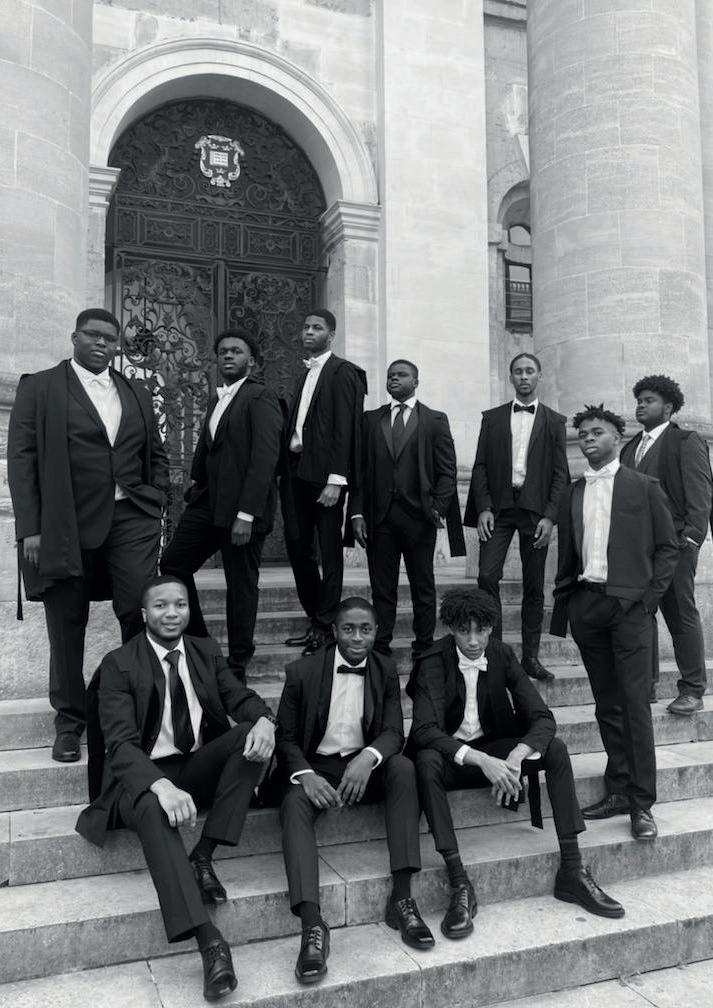
27
Joshua (top row, second from the left) helps to recreate the infamous Bullingdon Club photo, joined by nine other Black Oxford students.
Outstanding outreach:
A year of Access
Sara Harb (Outgoing McBain Access & Outreach Officer) reflects on her six years at Mansfield.
After the tribulations of the past two years, it is great to report that we have now resumed the vast majority of our in-person outreach activity – while retaining some virtual provision to maximise reach and impact. In 2021/22 we ran over 100 events for students across the UK, with plenty of opportunities to work in our link regions of south London and Yorkshire & the Humber, including a very busy Humberside UCAS Fair and a trip to the seaside at Hornsea.
750
visitors during our June Open Days
A highlight was the return of in-person Open Days (29 and 30 June), which attracted almost 750 visitors. Our team of 15 fantastic Student Ambassadors gave tours to prospective students and acted as willing victims/volunteers in demonstration interviews. The joy of Open Days is rarely the weather (Thursday was particularly rainy), but the interactions with prospective students, their friends and families, and showing off Mansfield at its best made them especially rewarding.
105

This report offers an opportunity for me to reflect on my last three years as Access Officer. As some may know, I am leaving my post at the end of summer 2022. It has been a pleasure working at Mansfield with such wonderful colleagues within College and the outreach community. I have met a wide range of young people and brilliant teachers and hope I have meaningfully contributed to Mansfield’s efforts to make Oxford more accessible to the brightest students.
Having spent six years at the College (three as a student), I will miss it enormously, but I am confident that Mansfield Access is in safe hands with Sarah and Helen, and look forward to reading about their adventures next year.

events ran for students across the UK
28
Sports news
Mansfield College Boat Club
Charlotte Withyman (Materials Science, 2018), MCBC President
We have just finished our first full year of rowing since the 2018/19 season at Mansfield College Boat Club – and there have been many highlights.
We began the year by getting nearly all the new Mansfield students down to the boathouse for a trial outing. From this, we had very good recruitment and retention all year, with four boats qualifying for Summer Eights.
Due to very generous donations from Antonio Bonchristiano (PPE, 1984), we were able to add another boat to our fleet. In honour of all the contributions from the Mahony-Greatorex family, we named it Carol Mahony. A lovely visit from the family gave us a chance to celebrate our donors’ generosity. A beautiful memory from Torpids was the W1’s speedy bump on St John’s. I think most of our
Sports roundup
Ittihad Hasib (Mathematics, 2020), JCR Sports Rep
After more than a year of Covid restrictions, team sports in Mansfield have been completely revitalised. Besides those I report on below, we’ve had many more teams representing our College in sports such as badminton, hockey, netball, croquet and even horse-riding. I’m looking forward to further success next year. With special thanks to Antonio Bonchristiano (PPE, 1984) for his generous donations to sport at Mansfield.
Cricket
After a relegation from the College league due to a lack of availability, the Mansfield-Merton cricket team turned their season around by reaching the Cuppers final. In the process they played some brilliant matches and knocked out several strong teams. They faced tournament favourites Magdalen in the final, ending just five runs short of Magdalen’s 135. The team are proud of their achievement and are ready to compete again next year.
Football
This year marked the return of competitive 11-a-side college football, with both the men’s and women’s Mansfield-Merton teams competing in

favourite moments from Summer Eights came from our O2, our boat inclusive to all genders, which had the best result in quite a few years. We thoroughly enjoyed celebrating with many alumni at our Summer Eights dinner.
We even went on tour, with a pre-season training camp at Wallingford. This inspired several of our members to join the University Boat Club’s development squads – keep an eye on them next year!
For bringing our team together and making every single member of MCBC feel so welcome, I must thank our captains, Eva Hassan, Ruth Gregg, Rowan Burford and Oliver Elliot-Williams, along with the rest of the committee.
the league and Cuppers. The women came second in the league and the men fourth, proving the Ms’ strength in football yet again. There’s hope of even more improvement in 2022/23 with rising new players in both teams.
Rugby
The 2021/22 season was not the easiest for the Mansfield-Merton men’s team. Limited numbers and injuries meant that the team had to play some matches at a man disadvantage. Despite strong efforts, this disadvantage proved too much for the Ms in the quarter-finals of the Bowl and they were knocked out. It hasn’t all been bad news though; in the annual Peterhouse match, the team won 7-14. In addition, a game against the Old Boys (which the Old Boys won) was a highly enjoyable event for all involved, giving some respite after a very difficult season.
Frisbee
The Affiliated Ultimate Frisbee team, of which Mansfield is one of the colleges, took part in both a league and Cuppers competition in 2021/22. Highlight of the year was exceeding expectations to come fifth in Cuppers, beating Wolfson College on the final point in a dramatic and well-fought last game.
29

Where Mathematics meets Art:
a Mansfield version of Escher’s Print gallery
Jon Chapman, Professorial Fellow in Mathematics & its Application
The works of the Dutch graphic artist Maurits Cornelis Escher (1898–1972) have long held a fascination for many mathematicians. In 1956, Escher made an unusual lithograph with the title Prentententoonstelling, which in English is Print gallery. In it a man stands looking at a picture in a gallery. In the picture is a Mediterranean town by the sea, and as you follow the buildings around from left to right and then down you realise that the gallery is actually one of the buildings in the town, so that the man is standing in the very picture at which he is looking.
The mathematics behind this print was uncovered by Dutch mathematicians Bart de Smit and Hendrik Lenstra in the early 2000s. In 2002, Lenstra gave a colloquium in Oxford explaining his work. I was fascinated – and immediately wondered whether I could use Lenstra’s theory to produce my own Escher-style pictures. That turned out to be too ambitious for the software and computing power readily available at the time (and indeed my own programming skills). But many years later, when technology had moved on, I dug out my old notes and managed to produce some Escher-style prints. (Incidentally, my wife believes that if I haven’t looked at something for 10 years, surely I should throw it away. I hold this up as a counterexample: I hadn’t opened the box containing my notes for over 12 years, but I knew where to find them when I needed them!)
The key, it turns out, is to start with an image with a scale invariance, usually known as the Droste effect, after a Dutch brand of cocoa powder. Here, for example, is a picture of me, holding a picture of me, holding a picture of me, and so on forever. If you blow this picture up by a factor of about three, it looks exactly the same.

To create the Escher effect, you slice the image, shrink one side of the cut relative to the other, and glue them together again so that you can’t see the join – but this time each image joins with the next image in the nested sequence. So now, if you move around the outside of the image, you see that I’m in the picture that I’m holding. The frame of the picture is now a spiral, instead of a nested sequence of rectangles. This spiral, and the associated copies of the same image at different scales, are not visible in Escher’s print. That’s because the scale factor is not three but 256 – the extra copies of the image are tiny and hidden in the small hole in the middle.

I had always thought that Mansfield’s buildings would make for a great Escher-style print. A lecture for maths alumni in March 2022 gave me the incentive to put one together. I decided to use a view of the College from across the main Quad, looking towards the Old Hall. Zooming-in to look through the window of the Old Hall, you see a group of students, and on the wall is the same picture of Mansfield, creating the scale invariance. Because 256 is such a large zoom, to get enough resolution in the final image I had to take multiple images and stitch them together carefully. Then I applied Lenstra’s map, and here is the result. You can see the students in the Old Hall, with a picture of Mansfield on the wall, and as you follow the picture round to the right and down you see that you are looking through the window of the building in the picture, so that the students are in the picture they are looking at!
30


31
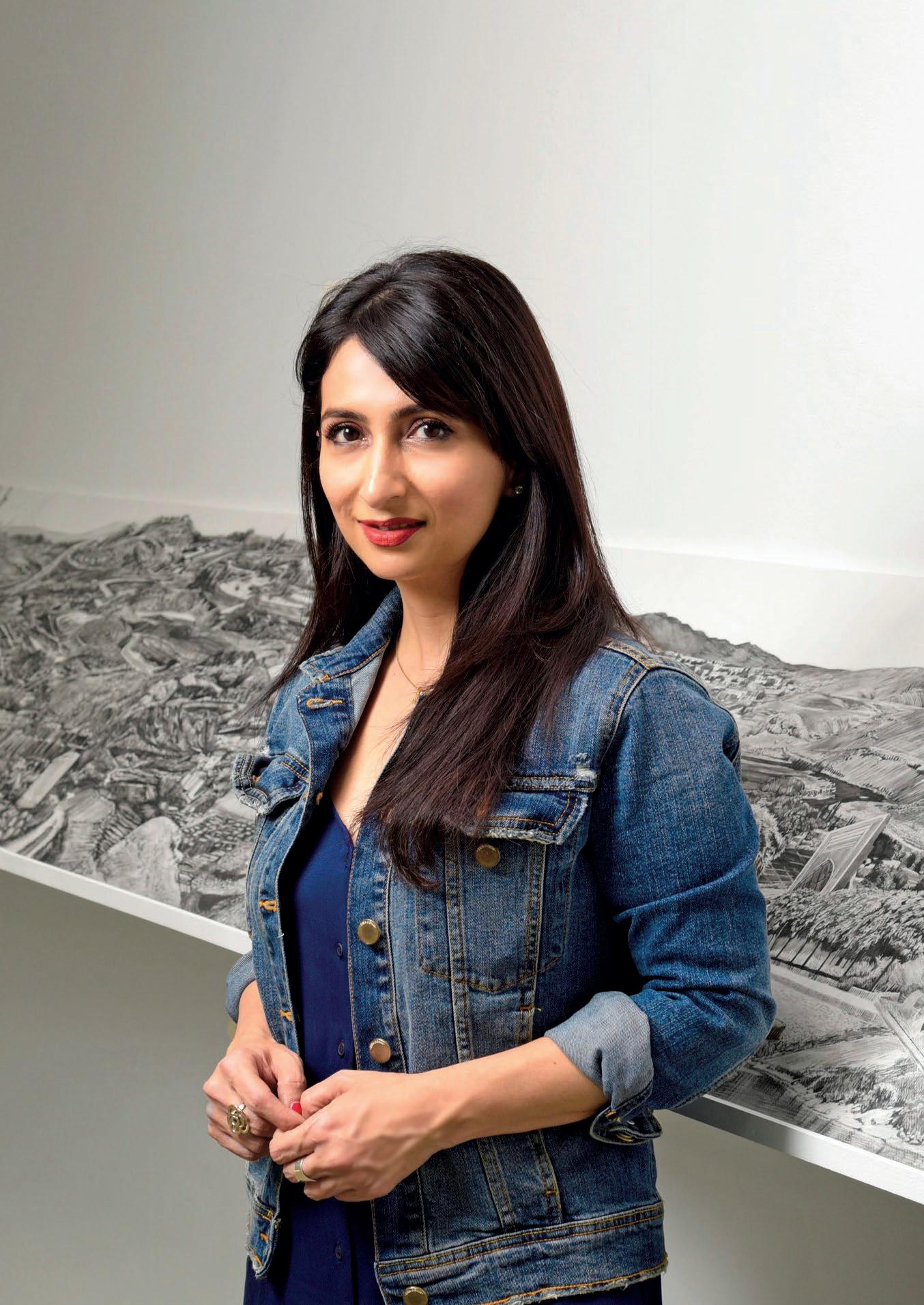
32
Saba Qizilbash, Baku to Multan

The Mansfield-Ruddock Art Prize 2022
Tess McCormick, Development Director
Each year, the Mansfield-Ruddock Art Prize is awarded to a selection of talented emerging artists graduating from the Ruskin School. The Prize enables Mansfield to build a collection of outstanding contemporary art while also supporting important new artists.
The project is the brainchild of alumnus Sir Paul Ruddock (Jurisprudence, 1977) and has received generous support over five years from the Ruddock Foundation for the Arts. Now in its third year, the Prize is already building a high profile thanks to the calibre of judges who have given their time and expertise.
In 2022, the Prize judges were: Rana Begum, contemporary artist; Adam Lowe, Founder of Factum Arte and Factum Foundation; Yana Peel, Global Head of Arts and Culture at Chanel; and Stephanie Straine, Senior Curator at the National Galleries of Scotland.
The latest Prize winners are particularly inspiring: Joy Labinjo’s work is rooted in her British-Nigerian heritage and her experiences as a Black woman
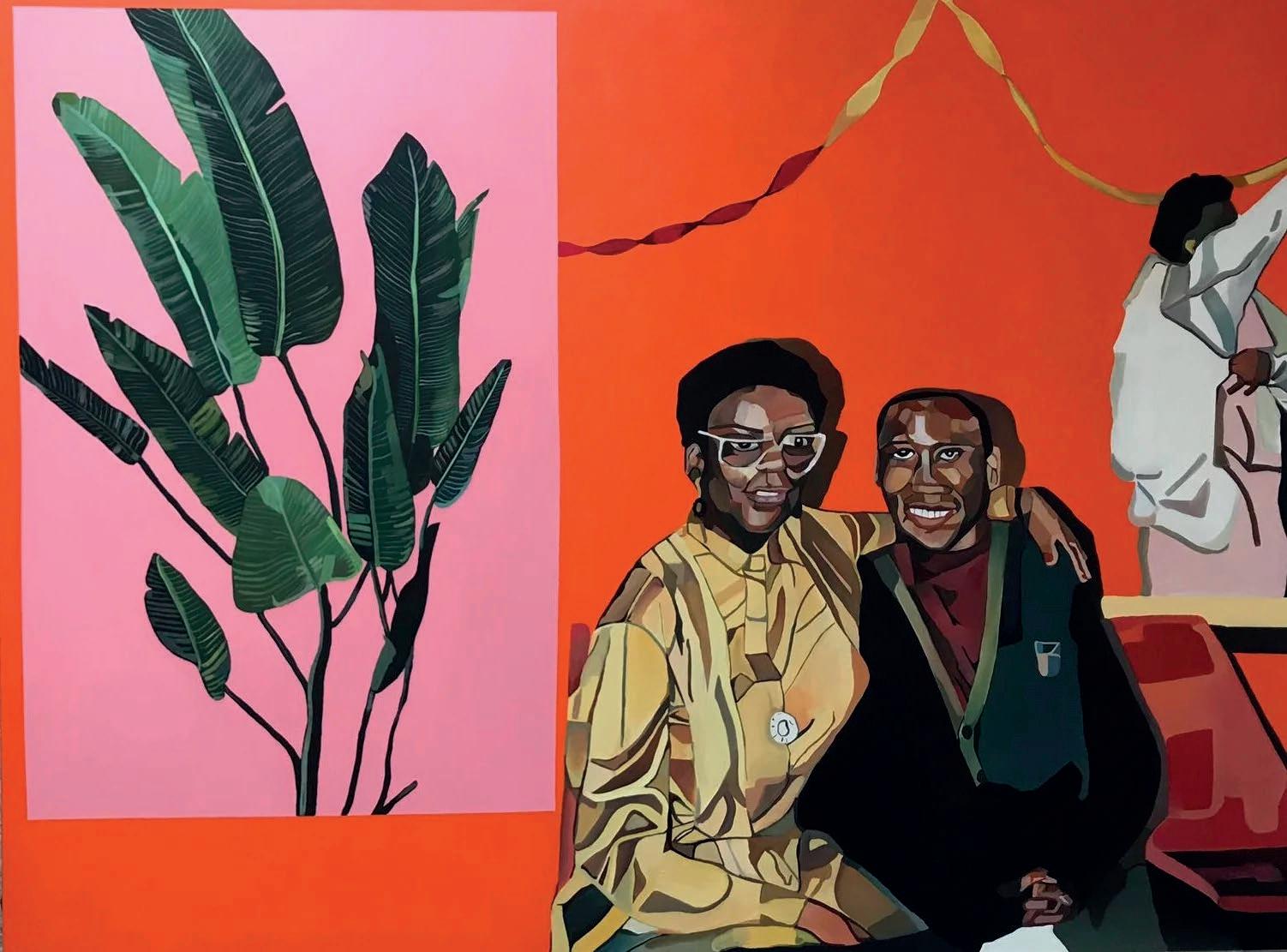
in the UK; Saba Qizilbash explores nationhood, citizenship and human movement; and Eliza Owen’s work focuses on movement between landscape and the architectural structures built within that space.
As well as support offered through the award itself, the Prize gives winners the opportunity to have their work displayed within the College. The art will be exhibited at Mansfield throughout 2022/23, and an event will be held to discuss the works with some of the judges and winning artists early in 2023.
We are most grateful to Sir Paul, the judges and the Ruskin School of Art for enabling this exciting collaboration to take place.
To find out more about 2022’s winners, please scan this code.

 Joy Labinjo, A celebration of sorts
Eliza Owen, Light fleck through trees
Joy Labinjo, A celebration of sorts
Eliza Owen, Light fleck through trees
33
Our Supporters
We give our sincere thanks to the 657 people who have made donations to Mansfield in the last financial year (1 August 2021 to 31 July 2022), including those who have chosen to remain anonymous. We are so grateful to you for your generous support. Individuals are grouped by their year of matriculation. We would like to give particular thanks and recognition to the members of our Sarah Glover Society, the 57 alumni and friends who have chosen to pledge a legacy gift to Mansfield.
We also thank members of:
The Bancroft Fellowship
Mr Antonio Bonchristiano (PPE, 1984)
Revd Dr Charles Brock (Theology, 1967)
Mr Jan Fischer (PPE, 1989)
Mr Guy Hands (PPE, 1978) and Mrs Julia Hands MBE
The late Sir Joseph Hotung
Mr Harry Leventis
Mr Alastair McBain (Oriental Studies, 1974)
Dr Lisbet Rausing and Professor Peter Baldwin
Sir Paul Ruddock (Jurisprudence, 1977)
The Mansfield Court
Mr Anthony Dewell (Mathematics, 2002)
Mr Christopher Foster (Mathematics, 1997)
Mr and Mrs J A Pye’s Charitable Settlement
Mr Bob Skelly (English, 1965)
Mr Timothy Throsby (Jurisprudence, 2009)
Mr John Willis (Geography, 1980)
The Wolfson Foundation
Guardians
Mr John Caird
Mr Roger Finbow (Jurisprudence, 1971)
Mr Giles Harrison (Geography, 1986)
Mr Matthew Keats (Geography, 1989)
Mrs Kathleen Russ (History, 1986)
Mr Stephen Sayers (History, 1972)
The Fairbairn Society
Professor Robert Adams (Theology, 1959)
Professor Dame Susan Jocelyn Bell Burnell FRS
The Council of Lutheran Churches
Mr David Elsbury OBE
Mr Toby Gosnall (Engineering, 1989)
Mrs Sarah Harkness (PPE, 1980) and Mr Peter Harkness
Mr Steve Harris (Jurisprudence, 1982)
Mr Rhys Hedges and Mrs Jillian Hedges
Mr Yang-Wahn Hew (History, 1997)
Mr James Hopkins (History, 1978)
Mr Ian Howard (Jurisprudence, 1974)
Mr Robin Ketteridge (Geography, 1984)
Mr Donald Macdonald (English, 1984)
Mr Steven Paull (Jurisprudence, 1974)
Mr Philip Rattle (English, 1984)
Mr Juan Sabater (VSP, 1984)
Mr Martyn Scrivens (Jurisprudence, 1975)
Mr Jonathan Steinberg (VSP, 1988)
Mr Matthew Tipper (Geography, 1983)
Alumni donors
1956
Revd Dr Robert McKelvey
1957
Revd Robert Scribbins
1959
Professor Robert Adams
Revd John Muir
Mr Victor O’Connell
Revd Dr Harold Tonks
1960
Revd Peter Moth
1961
Revd Robert Blows
Mr George Carcagno
Revd Anthony Coates
Professor John Creaser
Mr Richard Hill
1962
Mr Antony Payn
Revd Donald Rudalevige
1963
Revd George Agar
Mr Andrew Daykin
Dr Kenneth Parker
Mr Robert Porrer and Dr Sheila
Porrer
Mr David Reston
Mr Robert Smith
Mr John Thorndyke
1964
Mr Roy Foster
Revd Stephen Haine
Mr Anthony Lunch
1965
Revd William Boyd
Revd Dr Noel Davies
Professor Jeffery Hearn
Dr Fisher Humphreys
Mr Keith Lock
Revd Julian Macro
Mr David Parry
Mr Robert Skelly
1966
Mr John Cooper
Dr John Dorrell
Mr Peter Froebel
Mr Graeme Hartley
Mr Christopher Hayman
Mr Ralph Holmes
Mr Peter Lerner
His Honour Paul Worsley KC
1967
Mr Peter Bailey
Mr Sidney Blankenship
Mr Gregory Bowden
Revd Dr Charles Brock
Mr Paul Jay
Mr Peter Johnson
Revd Dr Roy Long
Revd Pastor Arthur Pedersen
Revd Graham Stephenson Professor Frank Woodward
1968
Mr Geoffrey Bott
Professor Johannes Maree
Dr Dabney Townsend Jr
1970
Dr Philip Aylett
Mr John Bell
Revd David Ivorson
Mr Roger Jackson
Revd Dr Arnold Klukas and Ms Carol Klukas
Revd John Landon
Dr Robert Lively
Mr Charles Long
Mr Jonathan Rooper
Mr Stephen Sheedy
1971
Dr Douglas Connor
Mr John Higgs
Mr Stewart Rutter
Dr Doug Stange
1972
Professor Eric Lund
Mr James Roe and Mrs Lynda Roe
Mr Stephen Sayers
1973
Mr Jonathan Arkush
Mr Martin Stott
1974
Mr William Annandale
Mr Ian Howard
Mr Alastair McBain
Mr Stephen Maguire
Mr Ian Neville
Mr Steven Paull
Mr Ian Taylor
1975
Dr David Bailey
Mr Ian Davison
Mr Chris Frewer
Mr Simon Gregory
Mr Charles Linaker
Dr Arthur Mielke
Mr Simon Morrow
Mr Martyn Scrivens
Mr Gordon Woods
1976
Mr Crispin Barker
Mr Sean Crane
Mr Philip Dean
Mr Stephen Gaskell
Mr Kent Kildahl
Mr Hugh Purkiss
Mr Robert Wakely
1977
Mr Chris Jenkins
Mr Geoffrey Lenox-Smith
Mr Clive Prestt
Sir Paul Ruddock
Mr Jonathan Wells
1978
Mr Timothy Booth
Revd Richard Church
Mr Antony Cook
Mr Guy Hands and Mrs Julia Hands
MBE
Mr Philip Jemielita
Ambassador George Krol
Mr Colin Sedgewick
Mr Mark Tantam
Mr Steven Thomas
Revd Richard Wolff
1979
Mr Bashir Ahmed
Mr Mark Beardwood
Mr Andrew Cannons
Mr Martin Christensen
Mr Martin Clemmey
Mrs Patricia Dean
Professor Glenn Holland
Mr Michael Ingledow
Dr Derek Jennings
Mr John Lysons
Mr Gavin Prosser
Mr Peter Vickers
1980
Mr Mark Jones
Mrs Elizabeth Llewellyn-Lloyd
Mr Paul Midwinter
Mr Christopher Monaghan
Mr Paul Palmarozza
1981
Mr Nigel Clarke
Mrs Melanie Clemmey
Miss Jane Coughlin
Mrs Melinda Cripps
Mr Geraint Rees
Mr Paul Vine
1982
Mr Graham Davis
Ms Sharon Flaxbeard
Mr Adrian Flook
Mr Rolf Howarth
Mr Richard Klein
Revd Iain McLaren
Mr Sean Moriarty
Mr David Testa
Mr John Weston
Mr Richard Young
1983
Mr Yogesh Bhagat
Mrs Lisa De Silva
The Rt Hon Lord Justice
Dingemans
Ms Gill Duddy
Mr Mark Jones
Mr Saul Jones
Mr Daniel Pollick
Mr Matthew Tipper
1984
Mr Brian Ashe
Mr David Bailey KC
Mr Antonio Bonchristiano
Mr Andrew Davies
Revd Peter Elliott
Mr Timothy Harris
Mr Andrew Hurst
Mr Robin Ketteridge
Mr Robert Mison
Mr Juan Sabater
1985
Mr Michael Holyoake
Mr Douglas Jeffery
Dr Frank Ledwidge
Mr Stephen Pollard
Mrs Jane Roberts
Ms Jaee Samant CBE
Mrs Veronica Williams
1986
Mr Giles Atkinson
Dr Charles Carter
Ms Alexandra Clark
Mr Jon Fish
Mr Andrew Gates
Ms Diana Glassman
Ms Sally Mason
Mr Daniel Nestel
Mr Ged O’Connor
Dr Matthew Scott
Mr Timothy Storrie KC
Mr Rik Tozzi
1987
Mrs Deborah Chism
Mr Nick Chism
Mr Richard Darby
Mr Brian Millar
1988
Ms Lisa Baglin
Mr Timothy Burroughs
Dr James DeCarli
Mr Simon Jones
Mr Jason Klein
Ms Catherine McClen
Mr Jonathan Steinberg
Dr Richard Underhill
Mr Michael Walls
Mr Stewart Wilkinson and Mrs
Tamsin Wilkinson
1989
Mr Neil Elton
Mr Jan Fischer
Mr Toby Gosnall
Mr Matthew Keats
Mr Andrew Moulton
Dr Toby Purser
1990
Mr Angelo Basu
Mrs Nicola Cathery
Ms Joanna Jameson
Mr Joseph Nuttall
1991
Mrs Kathryn Flanders
Dr Edward Goodwin
Mr George Hatjantonas
Mrs Shevaun Haviland
Mr Thomas Joyce
Ms Gill Kirk
Mr Daneree Lambeth
Professor Markus Mobius
Revd Martin Smith
1992
Mr Brian Arnold
Mr Simon Carmichael
Mr Andrew Croxson
Mr Paul Hamilton
Mr Simon Hards
Mr Paul Jackson
Mr Richard Kelly
Mr Benjamin Shaw
Dr Matthew Simpson
1993
Mr Richard Apps
Miss Elizabeth Badger
Mr Matthew Breitfelder
Mr Stuart Ferguson
Mr John Glen MP
Mr Stephen Gough
Ms Barbara Guenther
Mrs Alexandra Harle
Mr James Pearson
34
Miss Alice Pitt-Pitts
Ms Elizabeth Taylor Carson
Mr John Zolidis
1994
Mr Tom Bray
Mrs Kumiko Brocklebank
Mr Finbar Clenaghan
Mr Alexander Coakley
Mr Richard Davies
Revd Tiffany-Alice Ewins
Mr Zachary Finley
Revd Derek Hopkins
Mr Simon Kennedy
Mr Andrew MacDonald
Mrs Wendy MacDonald
Revd Iain McDonald
Mr Jonathan Parry
Ms Clare Skidmore
Miss Brigitte Worth
Mr Andrew Young
1995
Mrs Catrin Bennett
Mr Edward Bryce Morris
Mr Simon Calhaem
Ms Olwen Greany
Mr Michael Margolis
Mrs Gina Pattisson Brusik
Mrs Joanna Sampson
Dr Briseida Deyanira Sanchez
Mr Stephen Tall
Mr Gregory Wall
Mrs Maaike Wall
Mr Marcus Williamson
1996
Ms Laura Baggaley
Mr Timothy Berry
Mr William Cadbury
Mr Charles Classen
Mr Rishi Dastidar
Professor Jane Hamlett
Mr Marcus Haywood
Miss Anna Jenkins
Mr Matthew Maclaren
Mr James Selby
Mr Rhys Watkin
Ms Amber Wheeler
1997
Mr Philip Avery
Mr David Clyde
Revd June Colley
Revd Patricia Davis
Mr John Doy
Mrs Deborah Edwards
Mr David Falkner
Mr Christopher Foster
Mr Yang-Wahn Hew
Revd John-Daniel Laurence
Ms Hayley McRae-White
Mr Assad Maqbool
Mr Robert Moore
Dr Jayne Nicholson
Dr Daniel Palazuelos
Mr Matthew Reed
Mr James Uffindell
Mr David Varcoe
1998
Ms Helen Bray
Mr Richard Colebourn
Dr Kate Flynn
Ms Jessica Graham
Mr Martin Hall
Ms Chantal Hughes
Mr Damian King
Dr Rebecca Lodwick
Mr Sean Mackenzie
Mrs Emma Pell
Mrs Mary Pert
1999
Mrs Marie-Anne Barnes
Ms Cheryl Law
Dr Christine McCulloch
Mr Tom McLaren Webb
Mr Guido Wolf
Mrs Catherine Wright
2000
Ms Katherine Bilsborrow
Mr Robert Cumberland
Mr Marcus Edwards
Mr Niall McCarthy
Ms Lindsey Mepham
Dr Emilie Prattico
Mr David Robson
Mrs Rebecca Sumner Smith
2001
Mr Sean Beck
Mr Tom Buttle
Dr Richard Day
Mr Simon Hale
Mr Timothy Hirst
Mr Onyemachi Njamma
Miss Helen Prowse
Mr Nigel Simkin
Mr Jonas Twitchen
Mr Andrew Walker
Mr Kevin Whibley
2002
Mr Muhamet Alijaj
Mr Ryan Amesbury
Mr Richard Bazzaz
Mr Erik Darcey
Mr Anthony Dewell
Ms Alexis Faulkner
Ms Praveena Joseph de Saram
Ms Clare Knight
Mr Jonathan Lord
Miss Victoria Salisbury
Mr Gregory Smye-Rumsby
2003
Mr Alastair Brown
Revd Dr Chigor Chike and Mrs Obi
Chike
Miss Eleanor Coombs
Mr Ryan Fitzgibbon
Dr Carlos Jaramillo IV
Mr Edward Mayne
Mr Andrew Mitchell
Dr Katie Moore
Mr Peter Ringlee
Ms Catriona Rutherford
Mr Jack Sheldon
Mr David Wall
2004
Mr William Brewster
Mrs Rebecca Campbell
Mr Wing Hei Chu
Mr Johnny Elliot
Miss Alyssa Heath
Dr Valentina Iotchkova
Miss Alexandra Jezeph
Mr Benjamin Jones
Miss Rebecca Linnett
Ms Helen McKenzie
Mr Flavius Mihaies
Mr Thomas Oliphant
Mr Richard Saynor
Revd Timothy Searle
Miss Carina Watney
Mr Joseph Zhou
2005
Dr Horatio Boedihardjo
Mr Gordon Campbell
Mr Andrew Cook
Mr Roy Cooper
Dr James Dray
Mr Richard Dyble
Mr Thomas Foster
Ms Emma Gerrard-Jones
Dr Daniel Harvey
Miss Amy Icke
Miss Melissa Julian-Jones
Mr Thomas Leveson Gower
Mr Tony Morash
Dr Caroline Roberts
Mr David Sims
Mr Daniel Thompson
2006
Mr Shaolong Cheng
Ms Ruth Cook
Mr Vikram Dhindsa
Mr Siddhartha Haria
Ms Felicity Hawksley
Mr Reuben Holt
Miss Lauren O’Donnell
Mr Michael Shaw
2007
Ms Sara Bainbridge
Mr David Bruce
Mr Luke Bullock
Mr Daniel Cowley
Mrs Marianne Dring-Turner
Ms Jillian Fishman
Mr Nicholas Gomes
Mr Chirag Goyate
Mr John Kerr
Mrs Kerin McCauley
Mr Giles Rabbitts
Mr Daniel Seiderer
Mr Luke Webster
Mrs Joanna Wood
2008
Mr Andrew Campbell
Mr Christopher Du Boulay
Mr Benjamin Featherstone
Ms Grace Featherstone
Mr Ewan Miller
Mr James Nettleton
Miss Eilise Norris
Mr Mark Scott
Miss Adina Wass
Mr Matthew Williams
Mr Simon Williamson
2009
Mr Benjamin Ball
Dr Cheng Cheng
Mr Alexander Ford
Miss Rachel Freeman
Mr Matt Jones
Mr Andrew McCormack
Mr Christopher Major
Mr Frederick Overton
Mr Daniel Rey
Mrs Amy Rutter
Mr Alec Selwyn
Mr Nathan Webster
Mr Hao Wu
Ms Sarah Zaidi
2010
Mr Oliver Cohen
Dr Sarah Connolly
Mr Matthew Dodd
Miss Rosemary Hart
Mr George Hasell-McCosh
Dr Andrew Jungclaus
Mr Christopher Lee Evans
Mr David Lukic
Dr David Macdougal
Mr Amir Sokolowski
Mr Oliver Wood
2011
Miss Jennifer Atwood
Miss Sophie Ball
Mr Matthew Bradbury
Mx James Burnett
Miss Bethany Collett
Mr James Fisher
Dr Franziska Kirschner
Mr Karl Laird
Mr Joseph Morris
Mr Daniel Orford
Mr Timothy Smith
Mr Alex Starr
Mr Daniel Tarry
2012
Dr Peter Bergamin
Mr Alexander Botham
Mr Daniel Burridge
Miss Katherine Danks
Mr Adam Deane
Miss Nastassia Dhanraj
Mr Patrick Ferguson
Miss Amy Francis
Miss Victoria Hawley
Miss Rebecca Hird
Ms Rebecca Lee
Mr Eric Lewis
Ms Ariane Moshiri
Mr Ulysse Schnyder
Mr Jack Shuttleworth
Miss Alice Willcox
Miss Margaret Woods
2013
Miss Tabitha Jones
Mr Jordan Juritz
Ms Rachael Kershaw
Mr Robert Lazo
Miss Jehanara Mehta-Jamooji
Mr Jonathan Mellor
Miss Emmeline Skinner Cassidy
Mr Pei Wang
Miss Fay Watson
Ms Helena Wilson
2014
Miss Eloise Abbott
Miss Josephine Bearden
Mr Ferran Brosa Planella
Mr Toby Chapman
Mr Owen Clarridge
Miss Claire Maria Siu Kam Gibson
Mr Louis Jamart
Miss Stephanie McGuire
Mr Kiran Modi
Rabbi Steven Philp
Miss Charlotte Stephens
2015
Ms Anca Gabriela Bunda
Mr Michael Corbett
Miss Lucy Coupe
Miss Ella Grodzinski
Ms Kirsten Hedde
Ms Zoe Hodge
Ms Hildie Hoeschen
Mr Joseph Inwood
Miss Eloise Lee
Miss Miriam Nemmaoui
Mr Alexander Oscroft
Mr Matthew Palmer
Ms Amaris Proctor
Mr Michael Railton
Mr Matthew Sylva
Mr Conor Youngs
2016
Mr Tariq Ali
Ms Emily Cameron-Blake and Mr
Oliver Blake
Mr Noah Hurton
Mr Vladimir Lovric
Ms Margaret McGuirk
Ms Adrienne Mortimer
Miss Alicia Vidal
2017
Mr Pedro-José Cazorla García
Mr Henry Harrs
Dr Alvaro Menduina
Mr Matthew Rueter
Miss Fanmei Xia
2018
Mr Joshua Allan
Dr Kazuo Araki and Mrs Yoko Araki
Mr Alexander Feldhaus
Miss Charlotte Moore
Miss Fran Rigby
2020
Miss Natalia Brigagao Ferrer Alves
Carvalho
Miss Ellie Obrien
Mr Eric Zhang
2021
Miss Sophia Shieh
Friends and supporters
Professor Ros Ballaster
Mr Rokas Bancevicius
Mrs Jill Barnett
Mr Yves Bonavero
Ms Jillian Brown
Mr John Caird
Mr Mark Carter Sr
Mr Kenneth Davies
Mr Michael Edwards and Mrs
Alison Edwards
Mrs Jacquie Featherstone
Dr Heinz Fuchs
The late Dr Derek Goldrei
Mr Adam Gwilt and Mrs Diane
Gwilt
Mr Richard Hitchcock
Hobhouse Charitable Trust
Mrs Brenda Hunt
Mr Rene Kahn
Dr Gueorgui Kantor
Mr Alistair Kennedy
Mrs Carol Mahoney Greatorex
Mr Anthony Mallin
Microsoft Matching Gifts
Anne Mountfield
Ms Helen Mountfield, KC
Mr David Perry
Dr Colin Podmore
Professor Lyndal Roper
Miss Amy Ryder
Dr Robert Scott
Ms Colette Stein
Mr Richard Thomas
Mrs Vicki Waters
Mrs Margaret Wilmot
Gifts made in memoriam
Dr Alice Bamford
Mr Anthony Bradley
Special thanks to
Dr Maggie Aderin-Pocock
Ms Rana Begum
Ms Rebecca Birrell
Professor Allida Black
Mr Tom Blackmore
Mr Robert Blackmore
Sir Ian Blatchford
Ms Ita O’Brien
Revd Dr Charles Brock
Mr Chris Bryant MP
Ms Sue Casson
Ms Lily Casson
Ms Mel Clark
Mr Tom Fletcher CMG
Dr David M Goodman
Mr Thomas Heatherwick
Sir Peter Horby
Mr Ben Hudson
Professor Tarunabh Khaitan
Mr Adam Lowe
Miss Katherine Parkinson
Mrs Yana Peel
Mr Richard Pinel
Sir Paul Ruddock
Mr Matthew Ryder KC
Mr Stefan Stern
Dr Stephanie Straine
The Committee Members of the Mansfield College Alumni Association
Giving Day 2022 Ambassadors
Members of the Mansfield College Development Board
35
Obituaries
 Derek Goldrei Emeritus Fellow
Derek Goldrei Emeritus Fellow
1948 – 2022
One mark of the affection with which Derek Goldrei was held was the vast numbers that attended his funeral, including a great many former students. Derek was such a large personality, with a booming voice, and a laugh you could hear well before you saw him. He was great company, with seemingly boundless energy and evident intellect, an interest in everything and everybody, and an unstinting care for both students and colleagues. Then there was his huge generosity (many of us will have visited his time-share in Dublin) and great wit and sense of fun, with a nice line in off-colour jokes.
I had known Derek since we were in the same Oxford maths class as first year undergraduates. He was among the first to graduate in the new combined Mathematics & Philosophy course in 1970, and stayed in Oxford to study for a doctorate in Mathematical Logic under the supervision of Robin Gandy, though he actually spent much of this time working with Angus Macintyre and Harold Simmons at the University of Aberdeen on the model theory of Peano Arithmetic and its subtheories. We were office mates and somehow Derek persuaded me
to take Logic as a subsidiary in the MSc – which certainly broadened my mathematical outlook.
Derek’s main job was with the Open University, where he had worked pretty much since its inception (in the early 1970s). He was a passionate supporter of the OU and in particular of mathematics at the OU. In his role as Staff Tutor he recruited and mentored tutors, giving them the confidence to develop their teaching skills. He and his co-conspirator Bob Coates (who was also Derek’s predecessor at Mansfield) were two of the Maths Department’s stars, writing highly respected courses, endlessly debating the best way to present the ideas, and presenting them together on TV and radio with verve, imagination and humour. His roles at the OU included Head of Department, Programme Director and Sub-Dean, and I am told he was a very effective member of various committees. He also ran, virtually single-handedly, an online forum, where students would ask for advice about modules, not only giving guidance 24/7 on the forum, but also contacting many students individually with more personal advice – all done with humour, grace and lashings of positivity to encourage them to believe in their ability.
I was delighted when Derek was persuaded by Bob Coates to take a part-time post teaching at Mansfield in 2003, alongside his Open University work. He was an excellent, supportive colleague. During Admissions we would interview together with Derek doing the lion’s share of the questioning, always trying to help candidates give of their best. He became a Supernumerary Fellow in Maths and, on retirement in 2018, an Emeritus Fellow. He was also Senior Maths Tutor for the two years before he retired.
Derek quickly became part of Mansfield life. He was a calm voice in Governing Body and lunch with him was always entertaining, with many stories and the previously mentioned jokes, but plenty more – including detailed discussions about how best to help students. As one colleague reflects, he was ‘…a polymath with a huge interest in the arts and culture. I’ve lost count of the conversations we had about theatre, film, and books. I would see him bounding toward me on the Quad full of a thought or news to share.’ Derek was an innovative teacher and very popular with students as can be seen by these two representative comments: ‘He was not just a gifted teacher with an infectious enthusiasm for mathematics (and wine, and cheese), but he also encouraged us in our other endeavours and was genuinely interested in our well-being.’ ‘I loved how Derek encouraged discussion and debate in his classes – he made me feel so comfortable and confident to speak up, and ask questions if I was unsure… He was the only Maths Tutor I’ve ever known to bring snacks to classes.’ Food and wine were a recurring theme in Derek’s life and indeed he also held the key role of Wine Steward at Mansfield. He never really retired and continued with Intercollegiate Class teaching, giving his last class just a few months before he died. Students loved his classes and he received a Teaching Award from the Maths Faculty in 2017.
Derek also wrote two influential textbooks: Classic Set Theory (1996) and Propositional and Predicate Calculus: a Model of Argument (2005). Before Mansfield Derek had taught for other Oxford Colleges, particularly Somerville and St Hugh’s. One wonders how he found the time and energy to do so much, so well.
Derek died suddenly on his 74th birthday, far too early, and will be sorely missed by all. We send our condolences to his wife Lindsey, children Judith and Michael, and granddaughter Nancy, with whom he was besotted.
36
Dr Janet Dyson, Emeritus Fellow in Mathematics, with special thanks to Professor Rachel Hilliam for information about Derek’s many contributions to the OU, and to Professor Alex Wilkie for showing me the obituary he wrote for the IMA (Institute of Mathmatics and its Applications).

Sir Joseph Hotung Businessman and philanthropist
1930 – 2021
Sir Joseph Hotung was a great friend and important benefactor to our College, a successful businessman, philanthropist, a knowledgeable collector of Chinese art, and a dedicated supporter of education, human rights and many other causes. He died on 16 December 2021, at the age of 91.
This passion for human rights and education was the driver behind Sir Joseph’s early and superlative support of Mansfield’s ‘Love Lane’ campaign, the project that, as well as establishing new student accommodation (the Hands Building), founded and endowed Oxford’s Bonavero Institute of Human Rights.
In recognition of this outstanding gift, Sir Joseph, or ‘Joe’ to his friends, was made a Bancroft Fellow of Mansfield, and the beautiful lecture theatre in the Hands Building, shared with the Bonavero Institute, was named after him.
Latterly a Director of The Hongkong and Shanghai Banking Corporation
Ltd and HSBC Holdings, Sir Joseph actively participated in public and community affairs in Hong Kong and London. Among his many positions, he acted as Council Member at the University of Hong Kong and served as Chairman of the Arts Development Council, Hong Kong, and as a member of the School of Oriental and African Studies (SOAS) Governing Body at the University of London. In Hong Kong, he was a member of the Judicial Services Commission and on the Inland Revenue Board of Review.
Sir Joseph served on boards or committees of several major museums, including the Metropolitan Museum of Art in New York; and the British Museum where he made possible the construction of new galleries, including the Sir Joseph Hotung Gallery of China and South Asia opened by Her Majesty Queen Elizabeth in 2017.
He funded a postdoctoral research programme at Columbia University in New York, and established a programme for Law, Human Rights, and Peace Building in the Middle East at SOAS.
For his great contribution to educational and governmental bodies and his many charitable activities, Sir Joseph was knighted in 1993.
At a celebration of his life held at the British Museum in September 2022, we heard of Sir Joseph’s remarkable support for organisations such as the US /Middle East Project; his unwavering commitment to the British Museum over decades as a knowledgeable collector of Asian art, particularly Chinese jade, and as a philanthropist and Trustee; and his support for the development of ground-breaking stem cell technology at Moorfields Eye Hospital. We heard of Sir Joseph’s modesty about his giving, his elegance, discipline and exquisite taste, his insistence on the highest of standards, coupled with a wonderful sense of fun; his great love of family; his generous support not just of institutions, but the people working within them.
Former Principal of Mansfield, Baroness Helena Kennedy, spoke movingly at the memorial of her friend Joe’s strong sense of injustice, his commitment to human rights and the rule of law in the face of threats to democracy, and his foresight in making the Institute happen; above all, his wisdom, integrity, and humanity.
We send our deep condolences to Sir Joseph’s four children, their spouses, and his many grandchildren, his sister, and all his friends and colleagues.
Tess McCormick, Development Director, with words taken from Sir Joseph’s published obituary. Additional information kindly provided by Baroness Helena Kennedy, and speeches given at a memorial event at the British Museum in September 2022.

The Revd Richard McLaren
Diploma in Social Studies, 1966
1946 – 2022
Richard McLaren is thought to be unique in the history of Mansfield. He is the only undergraduate to have read for the Diploma in Social Studies; indeed, he achieved a distinction in that subject. He was also a successful captain of the Mansfield tennis team.
It seems that the combination of studying sociology and being at what was then primarily a theological college had a profound impact on Richard. After Oxford he worked for Coventry Cathedral
37
in the section devoted to urban problems. While there, he lived with a local vicar and on leaving, gave the first sign of the philanthropy that was to be a feature of his life. He knew the vicar was desperate to replace the church organ, so gave all that was needed to make the new organ a reality.
After Coventry, Richard lived in Westminster and spent a couple of years as an Education Welfare Officer for Lambeth. It was during this time that he set up an Urban Studies Centre in Canterbury.
Richard also started attending the non-residential ordination course at Southwark Cathedral, becoming deacon in 1975 and later priest. He first served at a parish in Charlton, south London, before being appointed to Christ Church in Kensington. Next came his most important posting: to Marylebone Parish Church where he served for 15 years. His impact there was enormous. Not only did he set up a healing and counselling centre in the crypt but also helped raise the money to build a magnificent new Rieger organ. His interests also combined when developing music therapy in association with the Royal Academy of Music. His last ecclesiastical connection was with St Mark’s Regent’s Park, where he was an honorary assistant for well over a decade.
As well as being a busy and very enterprising priest, Richard was a mildly eccentric man. For many years he drove a pre-war Austin 7 called Esmerelda, and a fellow priest described him as ‘wearing clothes unlike anyone else I’d ever met… looking like an artist or an actor.’ He married for the first and only time at the age of 60 and hugely enjoyed life with his beloved Diana. They shared a profound interest in matters artistic, musical and ecclesiastical. In 2006, they moved to Stoneleigh Abbey in Warwickshire where Richard continued to chair a charity, Art and Christianity Enquiry, which promotes art in sacred spaces and public understanding of it. Richard was also closely involved in Diana’s work promoting cultural
and environmental links with Morocco and Spain. He was greatly beloved of Moroccans, who valued his style! At the end of his life, Diana gave thanks for 20 ‘eccentrically vibrant’ years with him.
Richard was a priest, a sociologist, a philanthropist, a connoisseur, a visionary and a supporter of art and artists both religious and secular. He had a unique and compelling sense of humour. Far more than all that, however, he was the warmest and most loyal, generous friend. He profoundly touched the lives of all who came into contact with him. In short, he was a man of which Mansfield can be very proud.
Gregory Bowden with the kind assistance of Sir Kenneth Carlisle, The Revd Ricarda Witcombe and Diana McLaren.

The Revd Professor Bernard Roger Moss Theology, 1966 1944 – 2020
Bernard Moss was Professor Emeritus of Social Work, Education and Spirituality at Staffordshire University, an ordained minister in both the United Reformed Church and the Church of England and my treasured friend and colleague. He died suddenly in January 2020.
Bernard studied classics at Exeter University (1962-65) and then trained for Congregational ministry at Mansfield (1966-69). His Congregational then URC ministries were at Dewsbury URC (1969-74), Keele University Chaplaincy (197484) and Alsager URC (1993-2004).
After retiring from URC ministry, Bernard trained for the Anglican priesthood, serving at Odd Rode in Cheshire, St Mary’s Alsager and at the time of his death he was Associate Minister at St Mary’s Nantwich.
Such was his creative energy that Bernard combined Christian ministry with a career in academic social work. He was awarded a PhD for his published work exploring the relevance of spirituality to social work practice and workplace well-being. His co-authored book (with Jan Sellers) Learning with the Labyrinth: Creating Reflective Space in Higher Education (2016), is but one illustration of how Bernard’s mind effortlessly identified common themes across disparate disciplines to the benefit of each.
Students described Bernard’s teaching as ‘inspirational’. His gifts were recognised by the Higher Education Academy, which awarded him a National Teaching Fellowship in 2004 and later endowed him with Principal Fellowship status. He was one of only three UK university teachers to contribute a chapter to the prestigious international publication Inspiring Academics: Learning with the World’s Great University Teachers (ed Hay, 2011). Bernard had an extraordinary talent for making every person in his orbit feel welcomed and valued. His ready smile and genuine warmth of personality made him excellent company. Moreover, he was supremely driven by his Christian faith. Bernard believed that Christianity, at its best, is inclusive and non-judgemental. The guiding principle for all aspects of his life are found in Jesus’ words about bringing good news to the poor and setting the oppressed free (Luke 4:18). He was a true servant of the gospel as minister, teacher, family member and friend. Bernard is lovingly remembered and deeply missed by his wife Sheila, the wider family and his many friends and colleagues. My own life is so much richer for knowing him.
Revd Dr Susan Walker (URC Minister, Northern Synod)
38
College and University prizes 2021/22
SCHOLARSHIPS
James Allen (History)
Arianne Banks (Law with Law Studies in Europe)
Tobia Beccari (Mathematics)
Samuel Benjamin (Philosophy, Politics & Economics)
Nathan Bentley (Physics)
Matthew Bowen (Theology & Religion)
Liam Connolly (Philosophy, Politics & Economics)
Tommaso Crestani (Classics & Oriental Studies)
Oliver Elliot-Williams (Theology & Religion)
Louis Emanuel (Engineering Science)
Yihang Fang (Geography)
Alex Fisher (Physics)
Elizabeth Flaherty (Theology & Religion)
Holly Freed (Engineering Science)
Prisma Gautam (Materials Science)
Ilina Georgieva (Jurisprudence)
Robin Gerlach (Mathematics)
Akram Ghauri (Oriental Studies)
Sophie Gwilt (English Language & Literature)
Ittihad Hasib (Mathematics)
Rhiannon Hawkins (Geography)
Andrew Huang (Physics)
Russell Indradjaja (Materials Science)
G Jandu (Physics)
Karol Janiuk (History)
Anna-Tina Jashapara (Geography)
Ellie Jones (Jurisprudence)
Wiktor Kepa (English Language & Literature)
Caed Knight (Engineering Science)
Larissa Koerber (Jurisprudence)
Filip Kulas (Engineering Science)
Nick Lai (Mathematics)
Jim Laney (Engineering Science)
Isobel Lee (Geography)
Alexander Marlow (Jurisprudence)
Mitch Marshall (History)
Peter Miller (English Language & Literature)
Tom Morris (Mathematics)
Anna Obernoster (Human Sciences)
Ben Paterson (Geography)
Rajun Phagura (Materials Science)
Vlad Popescu (History)
Finn Prout (Human Sciences)
Mukesh Ramanathan (Mathematics)
Rosanna Roskilly (Materials Science)
El Salter (Physics)
Jihyun Shim (Mathematics & Statistics)
Mateusz Szewc (Engineering Science)
Tallulah Tufton (Theology & Religion)
Ewan Van Der Poel (English Language & Literature)
Natalie Vriend (Philosophy, Politics & Economics)
Jia Wan (Physics)
Freya Webb (Jurisprudence)
Toby Whelton (History)
Mary Whittingdale (Theology & Religion)
Max Winterbottom (Philosophy, Politics & Economics)
Charlotte Withyman (Materials Science)
Codie Wood (Mathematics & Statistics)
Yilong Yang (Engineering Science)
John Yap (Jurisprudence)
Mingyang Ye (Mathmatical & Theoretical Physics)
Leo Yue (Physics)
EXHIBITIONS
Srutokirti Basak (History)
Aleksander Bosek (Mathematics)
Efa Bowen (Philosophy, Politics & Economics)
Robert Brucal (Engineering Science)
Aftab Chhina (Jurisprudence)
Matthew Coulson (Materials Science)
Dario Cowdery (Theology & Religion)
Oluwafemi Fakokunde (Materials Science)
Emma Francis (History)
Anna Fraser (English Language & Literature)
James Graca-Jones (Materials Science)
Eva Hassan (Engineering Science)
Alex Hopkins-McQuillan (English Language & Literature)
Maxwell Huddart (Physics)
Nicholas Joinson (Materials Science)
Shastikk Kumaran (Jurisprudence)
Annabelle Leivers (Oriental Studies)
Wiktoria Malota (Engineering Science)
Evan Marlow (Engineering Science)
Harry Morrison (History)
Mia Oxer (Geography)
Izzy Pennington (Geography)
Connor Searston (Jurisprudence)
Emily Tait (History)
Emily Thornton (Jurisprudence)
Nathan Walemba (Materials Science)
39
COLLEGE PRIZES
Andrew Olive Prize for Economics
Kate French
Kwabena Osei-Boateng Engineering Science Prize
Hanwen Zhang
Mason Lowance Prize in memory of Malcolm Parkes for best performance in English Language & Literature Mods
Freya Buckley
Mason Lowance Prize in memory of Stephen Wall for best performance in English Language & Literature Finals
Ewan Van Der Poel
Henty Prize for outstanding second-year work in Geography
Yihang Fang
Mahony Prize for most commendable second-year performance in History
Jessica De Marco
Anthony Bradley Prize for most commendable second-year performance in Law
Winnie Wang
Simon Calhaem Scholarship for Law
Arianne Banks
Worsley Prize for Law Britney Bioh
John Sykes Prize for best Part I Materials results
Rosanna Roskilly
Adam Monk Scholarship for Mathematics
Norris Lam
Bob Coates Prize for Mathematics
Mukesh Ramanathan
Horton Davies Prize for best second-year work in Theology
Oliver Elliot-Williams
Lynda Patterson Scholarship for best Prelims distinction performance in Theology & Religion or Philosophy & Theology
Nikolai Ramage
Sarah & Peter Harkness Bursary Gabriel Lazar
Emily Suter
Alex Williamson
Sarah & Peter Harkness Prize
Freya Buckley
Grenader Family Visiting Student Prizes
Erin Lowe (Michaelmas 2021)
Ky Schardein (Hilary 2022)
Christian Barkman (Trinity 2022)
Visiting Student Prize for 2021/22
Yirui Wang
College Essay Prize 2021
Mary Whittingdale
UNIVERSITY PRIZES
Armourers & Brasiers’ Company/TATA Steel Prize best overall performance in Prelims practicals, Department of Materials
James Bennett
Armourers & Brasiers’ Company/TATA Steel Prize for best Team Design Project, Department of Materials
Rosanna Roskilly
Nathan Walemba
Armourers & Brasiers’ Prize for Year 2 Business Plan team presentation, Department of Materials
Sirui (Cindy) Liu
British & Irish Association of Jewish Studies Student Essay Prize
Mary Whittingdale
Clifford Chance Prize in Principles of Civil Procedure
Maxwell Davie
Commendation for practical work in Physics Part A
Hatam Barma
Gibbs Prize for best overall performance in Part I, Department of Materials
Rosanna Roskilly
John Gardner Prize for Philosophical Foundations of the Common Law
Maxwell Davie
Johnson-Matthey Prize, Department of Materials
James Bennett
Law Faculty Prize in Advanced Property & Trusts (Shared)
William O’Hara
Law Faculty Prize in Constitutional Theory
William O’Hara
Martin Wronker Prize Proxime, Law Faculty
John Yap
TATA Steel Prize for best overall performance in Part I practicals, Department of Materials
Nicholas Joinson
Vinerian Scholarship (Proxime Accessit) for the second best performance in the BCL
Maxwell Davie
Wilma Crowther Prize, Institute of Human Sciences
Anna Obernoster
40
Examination results 2021/22
2021
MASTER OF BUSINESS ADMINISTRATION
Distinction Hannah Folz
Distinction Selina Wang
Pass Vineet Bothra
Pass James Buckingham
Pass Diego Mata Saravia
Pass Atsushi Shibata
Pass Loki Vohra
Pass Maneesha Wijesinghe
MASTER OF PUBLIC POLICY
Pass Soumaya Belaid
MASTER OF SCIENCE (MSC)
Biodiversity, Conservation & Management
Distinction Michelle Sanders
Distinction Seth Thomas
Pass Meshvi Shah
Environmental Change & Management
Pass Zélie Pelletier Hochart
Nature, Society & Environmental Governance
Distinction Chupkatha Priovashini
Social Science of the Internet
Merit Buddy Janssen
Statistical Science
Pass Qianhe Hou
MASTER OF STUDIES
English
Pass Holly-Ann Perks
2022
DOCTORATE (DPhil)
Clinical Neurosciences
Oana Gurau
Economics
Andrea de Mauro
Engineering Science
Zubair Ahmed
Amna Riaz
History
Alexandria Dugal
Industrially Focused Mathematical Modelling
Ellen Luckins
James Morrill
Materials
James You Sian Tan
Mathematics
Joe Scull
Mandy Yao
Oriental Studies
Emil Sina Emami
Politics
Kate Yoon
Statistics
Emile Mathieu
MASTER OF SCIENCE BY RESEARCH
Engineering
Fangxiao Dong
BACHELOR OF CIVIL LAW
Distinction Maxwell Davie
Distinction Mathilde JaubertSchuller
Distinction Will O’Hara
Merit Eloise Hewson
Merit Lorena Voloseniuc
BACHELOR OF PHILOSOPHY
Merit Simon Custer
MAGISTER JURIS
Distinction Patricia Geraldez
Merit Thanasis Christias
Merit Chrysanthi
Kakoulantonaki
Pass Etienne Fritz
MASTER OF BUSINESS ADMINISTRATION
Executive Master of Business Administration
Pass Mazen James Ghafeer
MASTER OF ENGINEERING
Engineering
Class I Louis Emanuel
Class I Caed Knight
Class I Yilong Yang
Class IIi Jim Laney
Class IIi Ho Kyeong Lee
Materials
Class I Oluwafemi Fakokunde
Class I Prisma Gautam
Class I Charlotte Withyman
Class IIi Abhinav Vudathu
Class IIi Nick Watt
MASTER OF MATHEMATICAL & THEORETICAL PHYSICS
Pass Mingyang Ye
MASTER OF MATHEMATICS
Mathematics
Distinction Tobia Beccari
Distinction Robin Gerlach
Distinction Oliver Harding
Distinction Nick Lai
Mathematics & Statistics
Distinction Qi Jin
MASTER OF PHILOSOPHY
Economic & Social History
Merit Sandra Fleischmann
Economics
Merit Echo Wu
Pass Phoebe MacDonald
Pass Christopher Noah
Schneiders
Pass Jonathan Seiz De Filippi
Pass Ming Sheng
Pass Kun Yan
41
International Relations
Distinction Morgan Dacosta
Distinction Jonathan Seel
Modern Middle Eastern Studies
Distinction Kelly Skinner
Politics
Distinction Sam Cole
Pass Cécile Pick
MASTER OF PHYSICS
Class I Nathan Bentley
Class I Lex Joosten
Class IIi Cameron Matchett
Class IIii Forest Liu
Class IIii Jamie Priestley
MASTER OF SCIENCE
African Studies
Merit Olivia Tienin
Biodiversity, Conservation & Management
Distinction Lucía Artavia Guzmán
Merit Wahyu Nurbandi
Evidence-Based Social Intervention & Policy Evaluation
Pass Ishaan Sethi
Mathematical & Theoretical Physics
Pass Shira Ayal
Mathematical & Computational Finance
Distinction Arnaud Brun
Merit Dylan Weil
Pass Jiaming Cheng
Pass Sabrina Dai
Mathematical Modelling & Scientific Computing
Distinction Mathilde Leuridan
Mathematics & Foundations of Computer Science
Merit Yiping Miao
Modern Middle Eastern Studies
Distinction Adam Bernstein
Refugee & Forced Migration Studies
Merit Kimberly Rimber
Social Science of the Internet
Merit Axel Froissart
Merit Rachel Ricucci
Water Science, Policy & Management
Merit Alonso Hidalgo Amat Y Leon
MASTER OF STUDIES
English
Distinction Helena Anderson
Distinction Caleb Prus
Merit Xiao Ma
Merit Tahira Rowe
Pass Jack Lines
History
Merit Huw Thomas
Pass Izzy Grime
Pass Jiachun Xu
Theology
Merit Alexander Fogassy
Pass Dominic Lindl
Women’s, Gender, & Sexuality Studies
Merit Daisy Clague
POSTGRADUATE CERTIFICATE IN EDUCATION
Pass Katie Bouwer
Pass Amber Hendriksen
Pass Lily Rowe
BACHELOR OF ARTS
Classics & Oriental Studies
Class I Tommaso Crestani
English
Class I Sophie Gwilt
Class I Peter Miller
Class I Ewan Van Der Poel
Class IIi Emily Broughton
Class IIi Florrie Burke
Class IIi Lily Down
Class IIi Anna Fraser
Class IIi Sam Spencer
Class IIi Sarah Townsend
Geography
Class I Ruby Furniss
Class I Isobel Lee
Class I Mia Oxer
Class I Ben Paterson
Class I Izzy Pennington
Class IIi Bushra Elmoussati
History
Class I Srutokirti Basak
Class I Mitch Marshall
Class I Harry Morrison
Class IIi Chansol Park
Class IIi Emily Tait
Class IIi Harry Twohig
Human Sciences
Class IIi Anna Obernoster
Jurisprudence
Class I John Yap
Class IIi Emily Thornton
Mathematics
†Class IIi Flora Walker
Class IIii Luci Mullen
Mathematics & Statistics
Class IIi Matei Iorgulescu
†Class IIi Edward Turner
†Class IIi Jiahe Zhu
†Continuing to fourth year MMath
Oriental Studies
Class IIi Jed Kelly
Philosophy & Theology
Class IIi Alizeh Abdul Rahman
Philosophy, Politics & Economics
Class I Samuel Benjamin
Class IIi Adam Baker
Class IIi Efa Bowen
Class IIi Bailey Kavanagh
Class IIi Sean Sinanan
Class IIi Lumi Westerlund
Theology & Religion
Class I Dario Cowdery
Class I Mary Whittingdale
Class IIi Vincent Elvin
Class IIi Patryk Imielski
UNCLASSIFIED HONOURS
Engineering Science (Part B)
Class I Filip Kulas
Class IIi Mateusz Szewc
Class IIi Di Wan
Class IIii Jamie Bingham
Materials Science (Part I)
Honours Pass Matthew Coulson
Honours Pass Russell Indradjaja
Honours Pass Nathan Walemba
Honours Pass Elysia Zdolyny
42
Mathematics (Part A)
Honours Pass Konstantinos Adamopoulos
Honours Pass Alice Armes
Honours Pass Aleksander Bosek
Honours Pass Deepak Ganger
Honours Pass Ittihad Hasib
Honours Pass Dan Maloney
Honours Pass Katerina Panesova
Honours Pass Alex Young
Physics (Part B)
Class I Alex Fisher
Class I Andrew Huang
Class I Jia Wan
Class IIi El Salter
Physics (Part A)
Pass Hatam Barma
Pass Yixuan Guo
Pass Maxwell Huddart
Pass Ellie Obrien
Pass Archie Smedley
Pass Leo Yue
Pass Leyton Zhang
MODERATIONS
English
Distinction Olivia Ransome
Pass Liberty Brignall
Pass Aimee Hunter
Pass Leonora Krasniqi
Jurisprudence
Distinction Arianne Banks
Distinction Ellie Jones
Pass Aibhlinn Carroll
Pass Saris Dave
Pass Jes Gurung
Pass Shastikk Kumaran
Pass Ajay Mehta-Graham
Pass Kajaanan Vijitharan
PRELIMINARY EXAMINATIONS
Engineering
Distinction Jiabei Jiang
Distinction Hanwen Zhang
Pass Alex Selby
Geography
Distinction Eleanor Luxton
Distinction Eireann Staunton
Pass Zahra Ahmad
Pass Ky Johal
Pass Habiba Khan
Pass Ruby Mullin
Pass Dolly Richardson
Pass Emily Suter
History
Distinction Morgan Miller
Pass Isobel Davis
Pass Kiran Peers
Pass Daniel Surrey
Pass Declan Webster
Human Sciences
Pass Travis Bresa
Materials Science
Distinction James Bennett
Distinction Toby Folkes
Pass Ariana Manduku
Pass Ryan Pople
Pass Upasana Rajesh
Pass Ramunas Savanevskis
Pass Astoria Wang
Mathematics
Distinction Matthew An
Distinction Norris Lam
Distinction Henry Saunders
Pass Lauren Aitken
Pass Callie Phillips
Pass Jude Smith
Mathematics & Statistics
Pass Jonathan Oko
Oriental Studies
Distinction Gellért Miklossy
Philosophy & Theology
Distinction Nikolai Ramage
Physics
Distinction Qingyang Zhang
Pass Tom Amos
Pass Silas Lloyd
Pass Li Shi
Philosophy, Politics & Economics
Distinction Kate French
Pass Alex Boardman
Pass Jessica Critchlow
Pass George Dean
Pass Grace Hind
Pass Kevin Lee
Pass Charlie Rossi
Pass Leila Seif-Nobakht
Theology & Religion
Distinction Josh Treacy
Pass Hannah O’Sullivan
Pass Josh Soanes
Pass Red Visaya

43
Events calendar 2022/23
All events take place at Mansfield College unless otherwise stated.
NOVEMBER
Saturday 12th
Law moot and dinner
For all Law alumni and those working in the law.
JANUARY
Friday 27th
Mansfield-Ruddock Art Prize seminar
MARCH
Friday 3rd
The Hands Lecture
Our annual lecture on politics, economics and current affairs.
‘What next for Afghan women and Afghan politics?’
Speaker: Fawzia Koofi. Fawzia is a long-standing Afghan politician and women’s rights advocate.
Friday 10th
The inaugural Jonathan Cooper Memorial Lecture
‘The best of times or the worst of times? A generational perspective on the new queer reality.’
Speaker: Richie Jackson. Richie is an award-winning Broadway, television, and film producer; he will talk about his life as a gay teen activist in New York City at the height of the AIDS crisis, and raising a gay son 40 years later.
MAY
Saturday 13th
Special event for The Sarah Glover Society
All details TBC.
Date and speaker TBC
The Milton Lecture
Our annual interdisciplinary lecture, straddling politics, theology, social justice and literature, named after John Milton (1608-74).

JUNE
Wednesday 14th
Student Leavers’ Celebration followed by Leavers’ Service and the Annual College Commemoration Service
Saturday 24th
Alumni, Friends and Family Day Strawberries, cream and Pimm’s on the Quad. Mansfield will be hosting alumni gatherings in the United States in the Spring of 2023.
All details and dates TBC.
Upcoming gaudies
Get the date in your diaries now to reconnect with friends and Tutors from your College days at Mansfield!
2023 Sat 23 Sept 1990-99 matriculands
2024 2000-09 matriculands
2024 2010-19 matriculands
2025 1969 and previous matriculands
2025 1970-79 matriculands
2026 1980-89 matriculands
MANSFIELD PUBLIC TALKS
As well as all these events, please don’t forget our regular public lecture series, every Friday at 5.30pm during term-time. Entry is free and all are welcome. Most of our public talks are recorded with the permission of the speaker and shared on our YouTube channel: just search for Mansfield College. So, even if you can’t get to Oxford you can watch inspiring Mansfield talks on a wide range of topics at a time to suit you, wherever you are in the world.
FUTURE EVENTS
Check out our alumni e-newsletters and the events section of our website (scan the QR code below). Or contact the Development team: development@ mansfield.ox.ac.uk or on 01865 270998.
























 Lunar Year themed dinner
Shab-e-Yalda celebration
Shab-e-Yalda celebration
Lunar Year themed dinner
Shab-e-Yalda celebration
Shab-e-Yalda celebration







 A freshwater lake in the Rub’ al Khali, Oman. © Ash Parton.
A freshwater lake in the Rub’ al Khali, Oman. © Ash Parton.



 Amber’s new book builds on her diverse and global teaching experiences, including her first teaching post in Development Studies at Jimma University. Statue of student reading at Jimma University, Jimma, Ethiopia: 2015.
Amber Murrey and Professor Aziz Fall at the launch of Amber’s first book, ‘A Certain Amount of Madness’: The Life, Politics and Legacies of Thomas Sankara (Pluto Press, 2018) in Cairo, Egypt.
Amber’s new book builds on her diverse and global teaching experiences, including her first teaching post in Development Studies at Jimma University. Statue of student reading at Jimma University, Jimma, Ethiopia: 2015.
Amber Murrey and Professor Aziz Fall at the launch of Amber’s first book, ‘A Certain Amount of Madness’: The Life, Politics and Legacies of Thomas Sankara (Pluto Press, 2018) in Cairo, Egypt.














 Cesare Pavese
Cesare Pavese


















 Joy Labinjo, A celebration of sorts
Eliza Owen, Light fleck through trees
Joy Labinjo, A celebration of sorts
Eliza Owen, Light fleck through trees
 Derek Goldrei Emeritus Fellow
Derek Goldrei Emeritus Fellow




